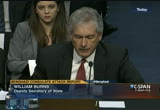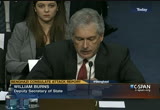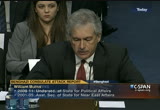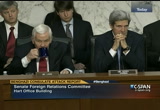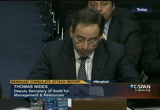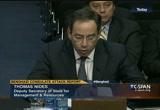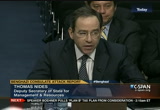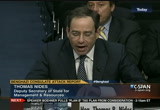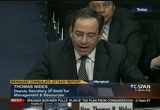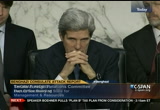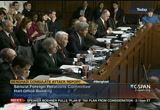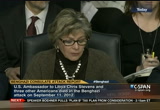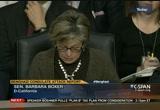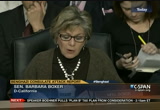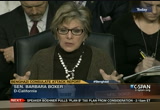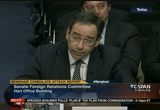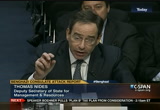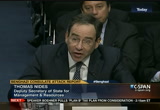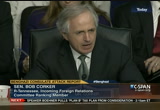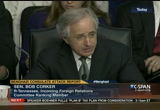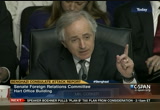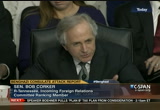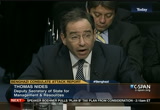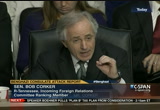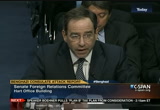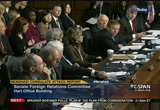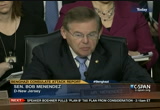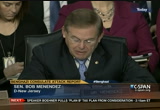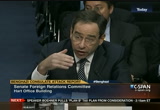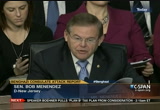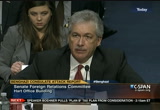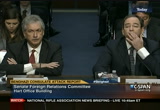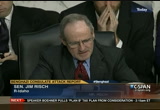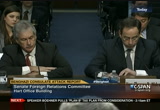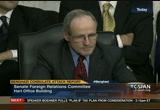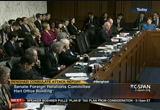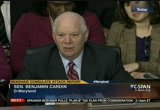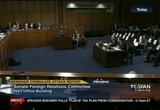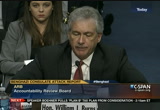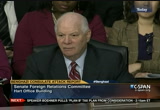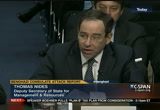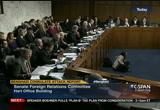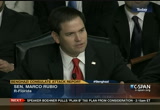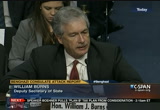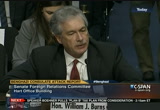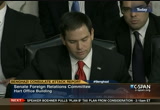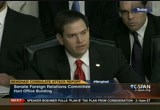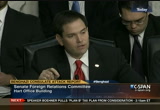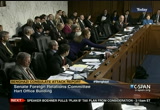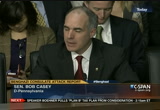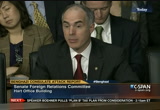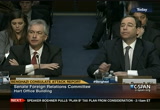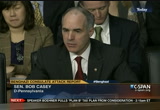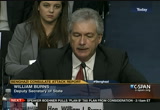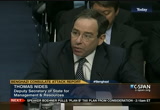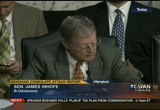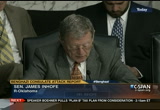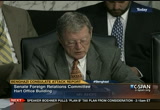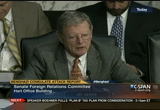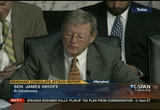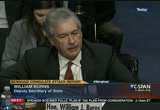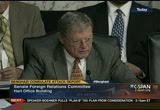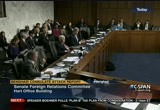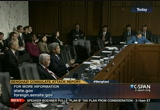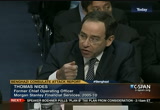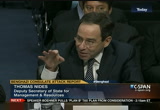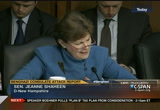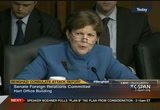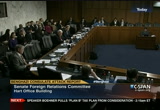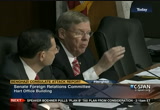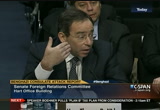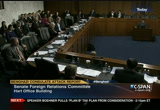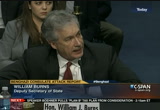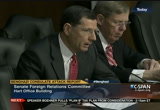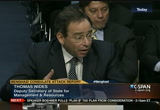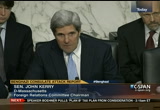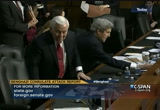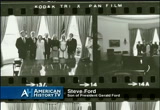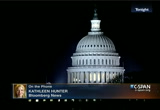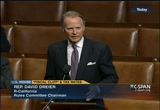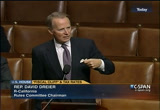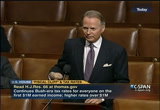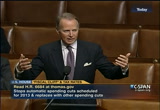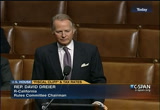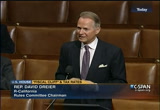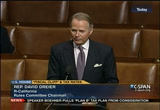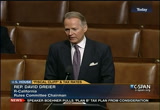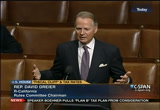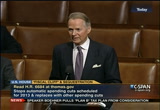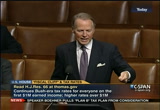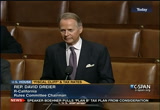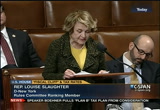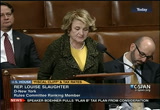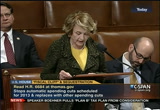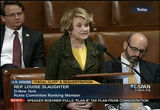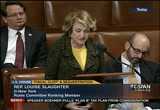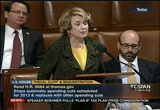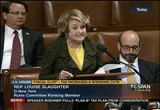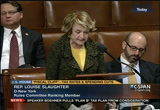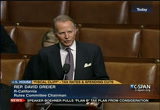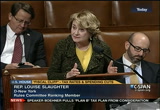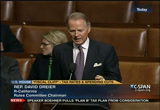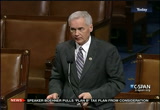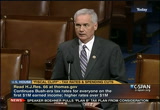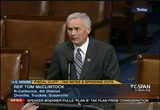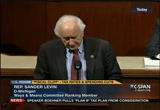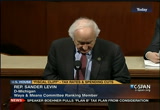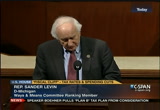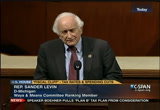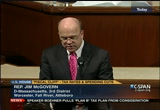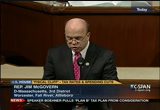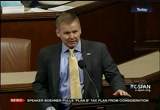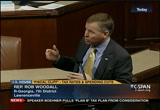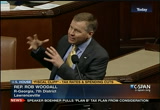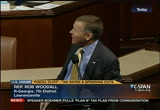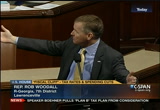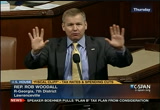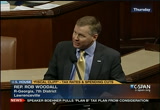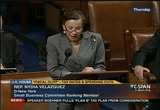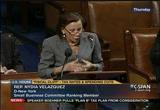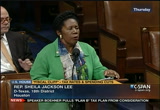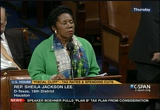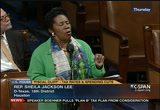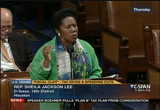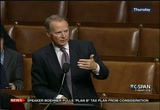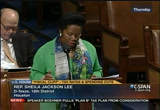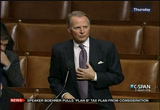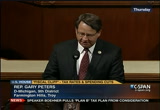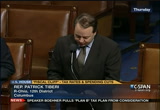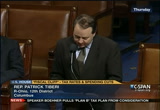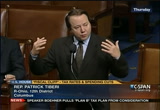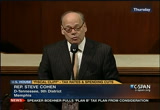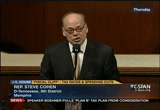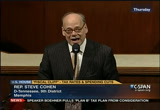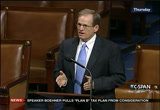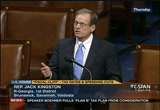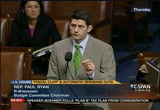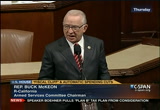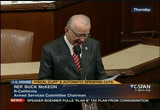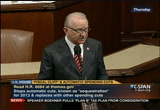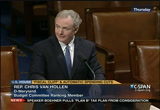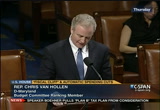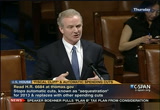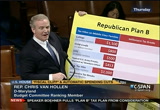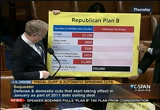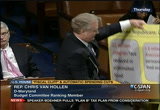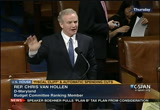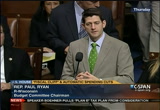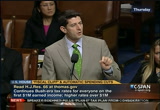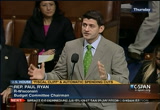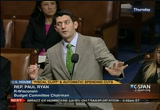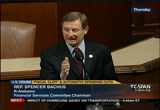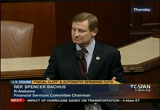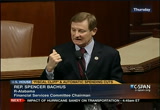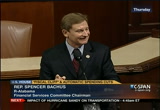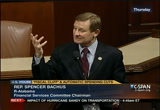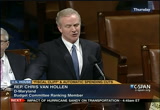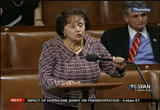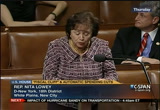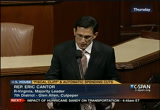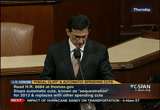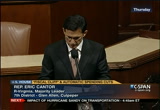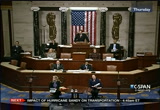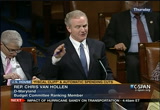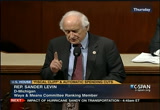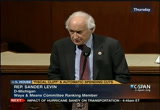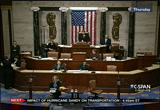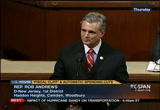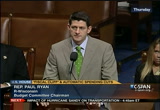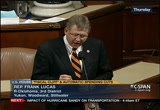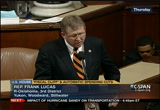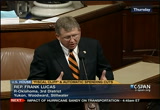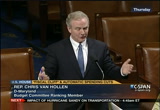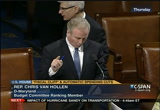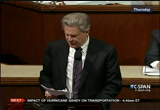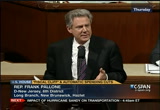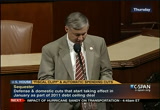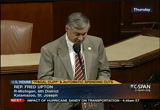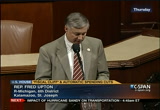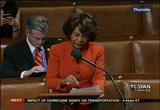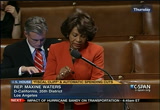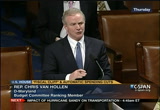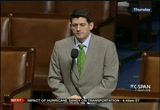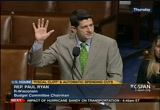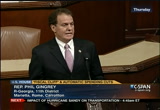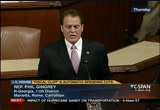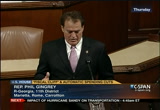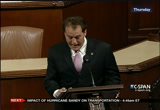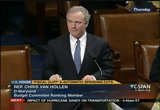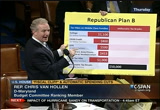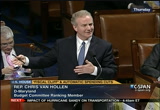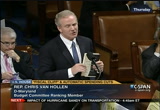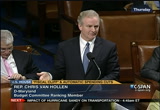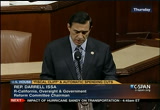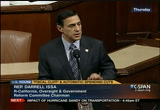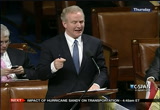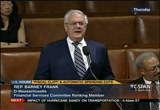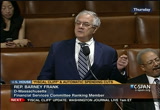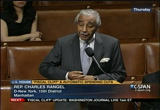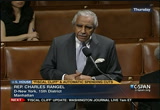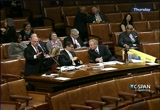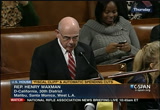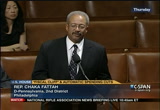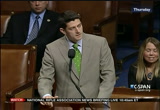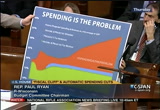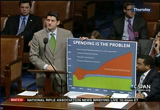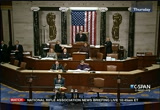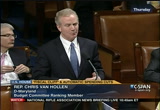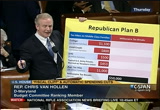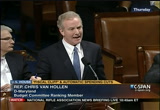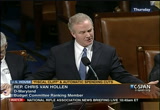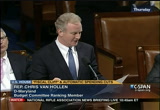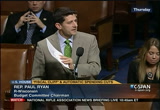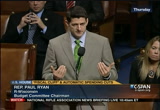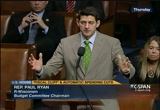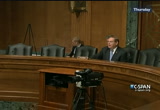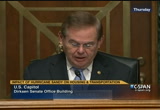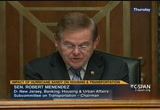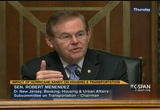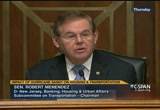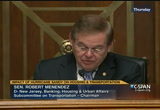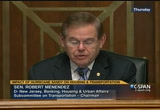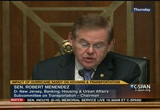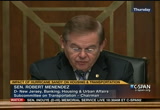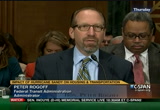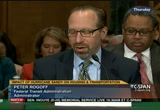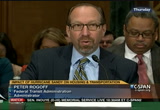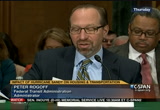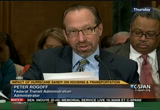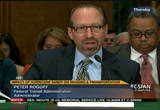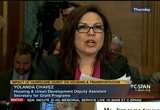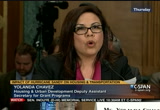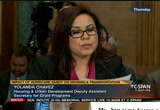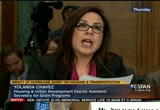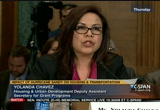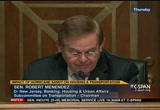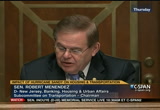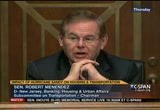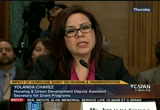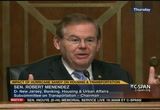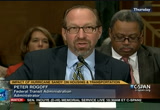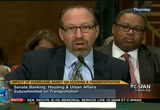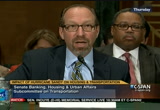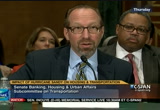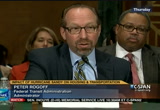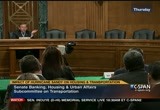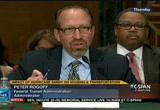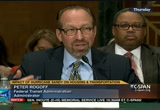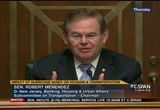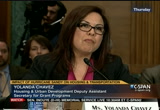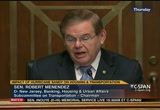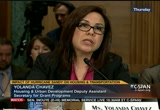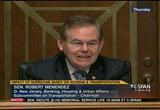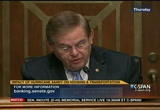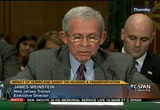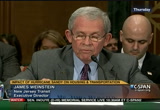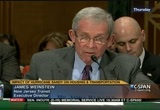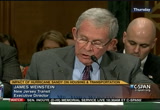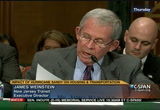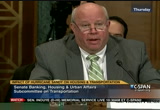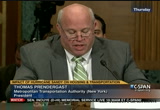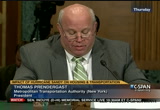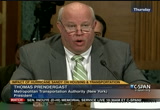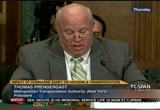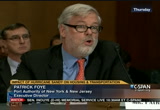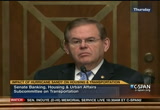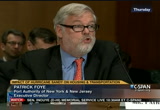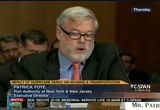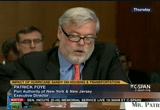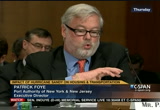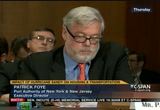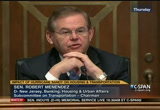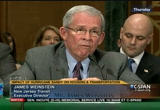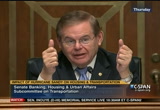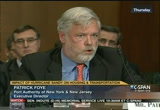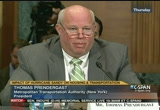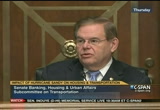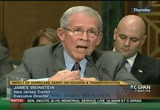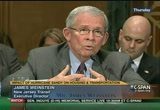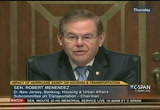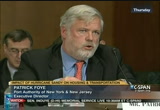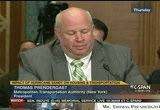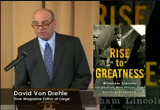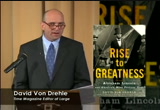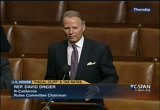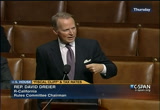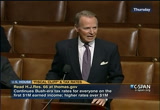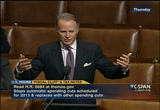tv Capitol Hill Hearings CSPAN December 21, 2012 1:00am-6:00am EST
1:00 am
dispatched emergency security teams, received a reporting from the intelligence committee, and took additional precautions. second, we intensified we continue to work to bring justice to the terrorist responsible for the attacks on benghazi. we are working with our partners to cut off terrorist finances and counterterrorist ideology and slow the flow of new recruits. secretary clinton ordered an investigation to determine exactly what happened in benghazi. i want to convey our appreciation to the accountability review board and former chairman of the joint staff and also he was all. -- you as well. the report looks at serious
1:01 am
systemic problems, outcomes that are not acceptable. problem's that secretary clinton has said that we take responsibility and problems we begin to face. i would like to add a few words based on my own experiences as a career diplomat in the field. i have been a proud member of the foreign service for more than 30 years. i have had the honor as -- of serving. secretary clinton has said that diplomats cannot work -- and do their jobs. there are consequences. our interest suffers and our security is threatened. chris knew that as well as anyone. we want to ensure the best possible security support for our people.
1:02 am
senior officials in washington sure that profound responsibility. we have to reduce the risk that people face and make sure they have the resources that they need. that includes the men and women of the depomed execute he service. i have been deeply honored to serve with many of these brave men and women. they are professionals and patriots. they serve in places where there is little or no u.s. presence. i trust them with my life. it is important to recognize that our colleagues and across the department at home and abroad get it right list times for years on end on some of the top the circumstances imaginable. he cannot lose sight of that. -- we cannot lose sight of that. we have to do better. be open to our colleagues who lost their lives in benghazi.
1:03 am
-- we owe it to our colleagues who lost their lives in benghazi. thousands of our colleagues are serving america in diplomatic posts around the world. we will never forget every act of terrorism and we'll never stop working to make things better and safer. the united states will keep leading and engaging around the world, including in those hard places where america's interests -- thank you very much. >> mr. chairman, senator lugar, members of the committee, i also want to thank you for this opportunity. all of us have a responsibility to provide the men and women who have served this country with the best possible security and support. the supervisors have evaluated
1:04 am
security needs and the sufficient funds. we all share this responsibility. secretary clinton has said that as secretary of state, this is the greatest responsibility and her highest authority. we focus on the steps we have taken from her direction. he will continue to take. -- we will continue to take. we look at the systemic problems. we are grateful for the recommendations. we accept everyone of them, all 29 recommendations. secretary clinton has charge my office with meeting a task force that will ensure that all 29 are implemented quickly and completely. we will pursue steps above and beyond the report. the undersecretary of affairs
1:05 am
and the deputy legal adviser will work with me to drive this forward. the task forces have met to translate the recommendations into specific action items to decide every single one of the responses for immediate implementation. several will be completed by the end of this calendar year. the others of the underweight the next secretary of state takes office. -- the others will be underway under the next secretary of state. we will work closely with congress to make sure they are met. secretary clinton wants us to implement these findings and do no more. let me offer clear specifics -- for more than 200 years, united states and other countries around the world provide security for embassies and
1:06 am
consulates. we have to take a new and harder look at the capabilities and commitments of our hosts. we have to re-examine how we operate in places that are emerged in deeper threats. under secretary clinton's direction, we have moved quickly to conduct a worldwide review of our overall security posture, with particular scrutiny at a number of high that posts. we have deployed five security assessment teams made up of diplomatic and military security experts to 19 post in 13 countries. we have cooperation in our departments at this critical time. there are emerging security challenges. we are working with the pentagon to send additional marines. that is about -- to mediate and
1:07 am
hyper posts -- high threat po sts. we are aligning our resources toward auntie 13 budget request to address is a cold owner abilities -- physical vulnerabilities. let me add that we might need your help in ensuring that we have the authority to streamline the usual processes that produce aster results. we are seeking to hire more than 150 additional diplomatic security personnel. that is an increase of about 5%. the recommendation is that we will target them squarely in high threat posts. i want to second the praise for these security professionals. i have served in this department
1:08 am
for two years having come to the private sector. i have traveled to places like iraq and afghanistan. i have seen firsthand how these dedicated men and women risk their lives every day. we owe them gratitude as they go to work every day. as he make these improvements in the field, you are making -- we are updating our procedures to increase a number of experienced and well-trained staff serving at those posts. we are working to make sure that the state department makes decisions about where people operate and where they share responsibility of security. our regional secretaries were directly involved in our security assessment processes and will assume greater accountability. we will provide congress with detailed reporting and every
1:09 am
step we take to improve security and implement the board's recommendations. we look to for for support and guidance as we do this. part of this is about resources obviously. we will work with you as needs arise. congress has a bigger role than that. you have visited our posts. you know the diplomats on the ground and the challenges they face. there are vital security interests at stake. we are all in this together. look forward working with you. thank you, chairman and counsel, for your support in these important matters. we will both be happy to take your questions. >> thank you. senator lugar is also going to yield to his time. we'll go directly to senator boxer. >> thank you, mr. chairman.
1:10 am
and senator lugar, i will miss you very much. will you please tell secretary clinton that we would like to give a message to her? i give my thanks once again to those -- to the families especially this holiday season. secretary clinton ordered a truly extraordinary investigation to find out what happened. i can say this -- i found this to be an extraordinary presentation. it was clear, tough, and i believe if we do not listen and follow the recommendations, it would be a disaster for our people out there in the field. i believe that we will.
1:11 am
i think our chairman for hacking this hearing. -- having this hearing. we have to change the way we view security at our missions. times are changing and the needs are changing. look, let's be clear. the administration requested to .6 million dollars for diplomatic security for the fiscal year 2012. the house cut the request by more than $300 million. the senate helped restore some of the funds, but it is still $200 million short. i always go -- it is important to note that in the house, there was an amendment to cut some funds from the military. the funding for the military band was $388 million. so, all i want to say is, we
1:12 am
need to get our priorities straight around here. we cannot walk away and invite another tragedy. as much as people like to say, it is not the money, it is the money. we cannot retract the facility -- protect a facility without the money. i'm looking at the security at our schools now after the tragedy in connecticut. it costs money to get the celebes hardened -- facilities hardened and the personnel that is needed. ambassador stephens was a proud californian. -- stevens was a proud californian. i will get to my question. i guess i will ask it straight out -- do you plan in the next budget to request funding levels that are necessary for protecting all of our facilities? >> the answer to that is yes,
1:13 am
senator. i am aware that we are under constraints. i remind the committee that for everything we do at the state department, that includes protecting overt 275 locations around the world, the assistance we provide including to israel, everything we do at the state department is less than 1% of our federal budget. >> my question is, are you going to submit to us the plan and the money request do believe you need and paying attention to fiscal constraints? will that be what you truly believe? because i hope so. you cannot count on us to know what the needs are. >> there is no question.
1:14 am
we have been ordered to come to congress and the med the 2013 budget requests -- and amend the 2013 budget requests. to add money for our construction costs and to increase diplomatic security for about 5%. we are in the middle of the 2014 budget process. we intend to come back to the committee once we do our assessment. we had an assessment team at the department of defense and the state department and look at 19 high risk posts. >> i didn't want to interrupt, but i have to. so you are going to -- >> yes. >> there were repeated requests to implement security upgrades at tripoli and benghazi.
1:15 am
as we look at this report, we know what happened. i would like to know if you intend to -- to put in place a process that would allow for a second review of these requests by another body within the state department? it seems that requests came to one particular individual or desk and it never saw the light of day. >> yes. one of the recommendations -- look at the request and how they are given to us and how we examine those requests. we will learn from incident in libya and be clear about digging into those requests. we have begun to set up individual task to look into this. >> may ask one last question? thank you.
1:16 am
how was this decision made and how do we avoid these types of failures for the hiring of contract guards? >> as you know, we relied on -- which we have had for 200 years. we rely on local governments to protect us. we have to do that because we do not have the ability to have enough troops on the ground and most of the countries -- and most of the countries will not allow us to. when we sent out the assessment teams, we need to find of the country's intent to protect us ability to protect us. sometimes those two are different. he have to constantly ask ourselves those questions. >-- we have to constantly ask
1:17 am
ourselves those questions. >> thank you. >> ideas well want to thank senator lugar for many years of service. -- i as well want to think senator lugar or many years of service. i thin i think it would be a shame to turn a page on this without -- i do look forward to this happening. i thank you for being here. i do want to say that i was on the ground in libya right after this happened. i was with the team there. i witnessed the shock of the colleagues they lost. i met the folks who were nothing short of absolute american heroes in what they did. i also witnessed the despair
1:18 am
that felt like they were out on a tether and did not have the support of washington. i am dismayed that this hearing is centered on additional money, which may well be needed, but as senator boxer said, we would have no idea. we have never done a top to bottom state department since i have been here. i hope that will change in the next congress. we have no idea whether the state department is using the money wisely or not. to each of you, what i saw in the report is a department that does not think outside of the box. it is not using the resources that it has in any kind of creative way. it is not prioritizing. i cannot imagine sending folks out to benghazi after what we saw on the security cameras and from the drones, i cannot
1:19 am
imagine that we have people out there with a lack of security. what the state apartment would have done is to -- state department would have done is to prioritize. if we cannot have people safely there, we should not send them there. why did we not prioritize that? secretary clinton sent us a notification to congress asking for $1.3 million. why did she not ask her notification or chains of resources to make sure that think ozzie was secure? -- that benghazi was secure? why did that not happen? >> we have fully embraced the recommendations. >> i understand. by the way, you have had 18 arb 's in the past and you have not fully implemented one yet. i want to talk about why you do
1:20 am
not ask for the resources for benghazi. just tell me why. >> as you know senator, we must re-examine all of our high-risk posts to determine the situation as we see it as newly evolving risk are occurring. we are in a situation where the middle east is eve all thing. -- evolving. democracies are growing and militaries are growing. the hector re-examining -- we have to re-examine the new normal. >> we have read the cables. you are fully aware. i do not understand why you did not send a notification. the cables came in with concerns about security, why didn't you
1:21 am
seek additional funds? appropriations committee never received from the state department and notification asking to ship funds for security and benghazi? why did that not happened? it happens almost all the time, almost weekly. >> we constantly evaluate our security posture. we evaluate where we need funds. we evaluate the currents to wish and on the ground. -- we evaluate events on the ground. mistakes occurred. we look at those mistakes and examine them. we make ourselves accountable for those mistakes. we need to make sure that those mistakes do not happen again. we get this right about 90% of the time. we would like to be at 100%
1:22 am
without question. we have over 275 posts around the world. our men and women are in danger all over the world. we tend to do this 100%. we hope with the recommendations we will learn from that and make sure this does not happen again. >> one last point -- there has been a lot of talk of money. every time there is an issue, we start talking about more money. the fact is, you had 16 security personnel team on the ground. they were funded by the defense department. no money issues. they have been extended multiple times at no cost to you. the defense department totally pays for them. aaa asked that they be extended
1:23 am
-- tripoli asked if they could be extended. and you said no. >> that team visited benghazi a few times. that team was posted in tripoli. >> we only had a person there on the ground ready days a year. -- 40 days a tyear. i do not understand. you talk about money, but you had 16 people free there. i requested that they stay and you denied it. i do not understand it. >> the team was in fact in tripoli. they did visit benghazi a few times. >> let me just say that i would
1:24 am
ask you to review the request. there is a very specific set of requirements. >> i have reviewed it and i will not a singlerb's, one of them have been fully implemented. i understand the process. i'm saying that the culture within the state department is one that needs to be transformed. maybe the next secretary of state can help. there is a lot of work that needs to be done there. >> thank you, mr. chairman. i want to say to senator lugar that he is leaving behind an extraordinary career and a lasting legacy in so many different ways. we appreciate your service.
1:25 am
we remember that ambassador stephens was a hallmark of what foreign service was all about. our challenge here and abroad in the context of terrorism is that the terrorists only have to be lucky once. we have to get it right when hundred percent of the time. it is a heavy burden. it is not an easy one. this time we do not get it right obviously. the state acknowledges where it made a mistake. i find it extraordinary that congress passed blame on one side and never seem to take responsibility of its own. i still hear voices that will not accept responsibility. i hear from 18 accountability boards. this may be the first it i am not mistaken. obviously this is going back
1:26 am
over administrations. you cannot implement the recommendations if one is about the resources and you do not have the resources to fight it by congress to meet those recommendations -- recommended by congress to meet those recommendations. the state and the congress should look at the responsibility to protect our embassies and diplomatic personnel abroad. reading directly from the classified section of the report, they say that can't review board says among various departments and personnel in the field, there appears to be a very real confusion over who was responsible and empowered to make decisions based on both policy and security incineration's. -- security considerations. that sounds like there was a
1:27 am
lack of understanding and their definition of responsibility. how can we change that in terms of the recommendation? as recommended, we will focus on organizational structure. we will look very closely at the involvement of the bureau, which oversees the countries in which the security recommendations are put forward. we will make sure communication between the field and the diplomatic security is correct. we will continue to make sure that there are double checks to make sure they are evaluated and look that. a lot of eyeballs. we will look at the security requirements and be very clear
1:28 am
eyed about the request and determination on the security situation on the ground. >> we'll have more horizontal effort within the department and sharing information and knowledge. there will be a clear delineation of who has responsibility. >> i think that is one of the lessons that came out. >> one of the other elements of the report is on intelligence and in an essence, intelligence failure. we have relied on specific threats as the aces of reacting and preparing versus a careful consideration of deteriorating threat situation in general. can you talk about how the department seeks to combat that new reality? >> that is a challenge that we
1:29 am
need to be much more effective in addressing both within the state department and also i think throughout the intelligence community. across eastern libya for many months and before the attack took place in benghazi, there was a troubling pattern of deteriorating security. not all of this was directed at the united states, but there has been a tendency across the world in recent years for us to focus too much on the civic credible -- specific article threats. ats.redible thre there are specific recommendations that the review board has made that we will implement. the state department will work with the rest of the intelligence community. >> finally reading from the report again and having listened to both personnel where they
1:30 am
made it clear there were mistakes made, a significant problem here is resources. we can hide our heads in the sand or we can meet that challenge. it is imperative that the state department is mission driven rather than resource restrained, especially in briski places in the world. -- risky places in the world. i hope that when you present your budget at the same time that you are asking for what accountability review board has recommended as one of its recommendations that in fact you also give us the sense of the reforms that you are pursuing so that congress will feel more empowered to be responsible, and therefore help you meet the challenges of our diplomats abroad.
1:31 am
>> thank you, mr. chairman. first of all, it is an unfortunate that he has to go through an instant -- that we have to go through an instance like this to get our act together. everyone has been to in the seas all over the world. what has -- and the seas all over the world. i see the marines standing there and they say good morning when you walk in. locals are operating under a 200-year-old agreement for our operations to work in their country. the rules have changed over the last 200 years. you get a real sense of incompetence when you go through their. generally those people are confused. most of them you would not meet
1:32 am
going into a theater here in the united states. i guess what you will have to do is instead of treating all of these the same, each one will have to be treated differently. every host country but have to be treated differently. our reputation in that world and the feeling of americans in the world has changed or manically the last 200 years. --dramatically over the last 200 years. i have been shocked in some of the countries i have been in and they are not friendly to the united states. there is a minimal amount of marine presence of their. -- over there. i learned for the first time that the marines there are kerry to documents -- to carry
1:33 am
documents. that's a shocking. their first priority should be to protect americans act the embassies. -- at the and the seas. sies.em-- embas it would not have taken much to stop the attack in benghazi. they would have responded to it immediately it seems. again, you are looking at film. when armed people are coming through the front gate, it would've same -- it would seem to me that something should be done about it. again, i did not have any questions for you. i have looked at the review board. we have our own view about what would be stronger and what would be best. the bottom line to take away is that ends will need to be done a lot differently than what they
1:34 am
have been done. we really need to discriminate amongst countries as to what kind of effort we put forward. with that, i yield the rest of my time. .> thank you >> i also want to extend my congratulations to senator lugar. thank you for your service to our country. thank you very much. and to secretary burns. thank you for your service. my prayers goes out to those lost in benghazi. i know you have worked on a specific authorization bill. you have had discussions. it is important in the next congress we have a full committee discussion on the state department authorization act so we can wait in a more deliberative way on the policies on the responsibilities
1:35 am
of this committee. i want to follow up on their points on intelligence and recommendation 21 is very clear on this. post-2000 one, intelligence collection has expanded exponentially. -- post-2001, intelligence collection has expanded exponentially. careful attention should be given to factor showing deterioration threats. >> let me just point out that it was clear in benghazi that the security was deteriorating. maybe not a specific threat. we knew that the local security team was not what hundred percent reliable. back was known. -- was not 100% reliable.
1:36 am
that was known. i would like you to expand more on how we are going to institutionalize careful attention so that we do not allow a situation such as benghazi to occur in the future. we cannot eliminate all threats . we know that. we also know there was not enough adequate security based on deteriorating circumstances. how do we institutionalize that careful attention to make sure that in those types of dangerous assignments that we have adequate security? ambassador stevens newly be a perhaps better than any other american. his judgment will never be second guessed. it is important that endangers posts that there be -- endangers posts that there is -- that he
1:37 am
has the best advice on a broader basis as we go into these types of circumstances. how do we institutionalize that? >> you raise a very good point. with regard to the intelligence, there was a troubling pattern that developed. a lot of the mileage was directed at the united states, but not -- a lot of the violence was directed at the united states, but not all of them. >> there were a lot of reasons. >> there were a lot of potential motives. chris stevens understood benghazi as well as anyone. one of the in the lessons we learned is the importance of being able to take a step and try to analyze better the broader pattern of the security challenges that were emerging.
1:38 am
there needs to be a sense of responsibility on the part of all of us in the state of department. we are trying to better understand those challenges and not be fixated on specific credible threats. >> i will be very interested in how you institutionalize that review that goes beyond specific threats. i hope you will share that with us. i think you said that there is a streamlining process. you also mentioned there might be concerned with additional marine assignments within a host country. is there anything we need to be aware of as you implement these recommendations as it relates to bureaucratic streamlining that might require congressional attention?
1:39 am
>> senator, thank you. thank you for the cooperation. not only did they agree to send very confident, trained officials with our state department colleagues to the 19 posts immediately right after the incident, but one of the recommendations that came back with general dempsey as secretary panetta and secretary clinton and the white house agreed that the additional marines would be enormously helpful. that is to protect confidential information, but there's also no question that they are a
1:40 am
deterrent. the additional requests -- the 35 additional detachment should -- we are also asking to build attentional barracks on the ground where we possibly can so that the marines can live on the facilities. the cooperation between the defense department and the state department is important for a situation like this. we will come to congress for the appropriations to pay for that and also the authorities in which will be working with the dod and discussing with the relevant committees. >> thank you, mr. chairman. i want to commend senator lugar for his service to our country. i hope you will take this as a compliment because i have been
1:41 am
watching you since i was in high school. i have a passion for foreign- policy. i'm pleased that i got a chance to serve with you for two years on this committee. i also want to thank you for our service to our country. thank you for being here. this report has furthered our understanding on what happened in benghazi. there is one part of it where i am a bit puzzled. there is a lot of blame on lower officials. i find that puzzling. benghazi, libya is not some kind of outpost. .'m curious , theage five of the report
1:42 am
unclassified version talks about the special mission was not a priority for washington. i want to understand who washington is. i have a number of questions. i know that secretary lincoln visited libya in 2011. did that deteriorating security happen after interactions with the libyans? >> i'm not sure. i was not on that trip. i can only speak on my own experience. i visited libya in july and also in september after the attack in benghazi. i can speak from my own experience. secretary clinton has said that all of the leaders in the department are accountable for what happened. i accompanied the remains of my poor colleagues back after the
1:43 am
attack in benghazi. i cut short a trip in iraq to come back with them. on the long flight home, i had time to think about sharper questions i would have asked and i could've added.cus >> did the folks on the ground say to you what they were worried about what was happening with security and the number of requests? >> i did talk to ambassador stevens about the security situation. he did not talk specifics at that time. >> did you know the security situation came up in this thing ? this was in 2012? >> i'm certain that it did. we emphasize the importance of not only improving the security capabilities of the libya
1:44 am
government at that time. we offered a number of programs to help them build institutions. that was a central feature, as it was in july when i met with the prime minister. >> you are pretty sure that the issue came up -- you met with the deputy prime minister in june of this year? did it come up then? >> it did. i was offering them support. >> who in the department was briefed on the cables that was sent from the posts in june and august of 2011 regarding the security situation? to what level did those cables get reviewed? >> they have been reviewed up to the secretary level and maybe some of my colleagues on the seventh floor as well. >> were any senior officials
1:45 am
made aware of the repeated requests from those post? for additional security? do you know beyond the secretary levels or whoever forwarded the memo? >> i'm not aware of any specific memo that regarded the specific request. >> do you know anyone beyond the secretary assistant level going up to the secretary level? were they made aware of the incidents that occurred in benghazi reading up to the months of the attack? -- leading up to the months before the attack? and for the trips to libya and other senior officials from the state department, were there any memos after the visits basically saying we have been to libya and by the way, the stations were
1:46 am
concerned about security in general and the libyans were concerned about their ability to provide security? were there any meetings convened? memos produced? >> ever meetings that took place at senior levels. -- there were meetings that took lace at senior levels. certainly, that was a subject that was a fairly consistent concern. there were a number of occasions that push the libyan government to try to accelerate and develop those institutions. >> beyond the assistance of the secretary level, there was a general and specific awareness of a rapidly deteriorating security situation in libya and the repeated requests from the team on the ground for security
1:47 am
and the inability of the libyans -- -- therer, i'm sorry was an awareness of the deteriorating security situation. there was not only a general awareness, but a concern. >> above the secretary assistant level, correct? >> they were aware of the incapacity of the libyan government institution. we worked hard to try to push the libyans to go in that direction. >> thank you, senator rubio. >> i want to reiterate what has been said by many on this panel today of senator lugar's great leadership. he has been a mentor to many of us even when he did not know he was being a mentor. i do not know if you will
1:48 am
continue to serve in another capacity are many capacities. we also want to give our condolences about the loss of the state department suffered. ambassador stevens and three others were killed. that is why the questions we are debating are so grave and meaningful. as reflecting upon the challenge that you both have and the state department has in light of the report and in light of the subject matter that led to the report, because of that i guess you try to think and your own life what experience is relevant to form the questions that you have or the points that you want to make. two are relevant in my life. one is a traveling that i have done across the world as a member of this committee. three times in pakistan and several trips to the middle east. last time another senator and i
1:49 am
were traveling together. seeing the difficulty of providing security not only for folks and embassies and consulates, but when members of congress travel and the danger that we feel sometimes even with the not that we have security around us. getting that balance right, we do have to get it right every time. the taxpayers expect that. they expect us to put forward every effort. expected of you and of us. my other experience as a state official in leading investigations and audits of agencies, we are really hitting them hard. people get fired up. we demand accountability and results. i do know this -- when a report is issued and findings are made,
1:50 am
you cannot simply us and congress or state officials just yelling and screaming about the results. yelling and screaming about recommendations. resources matter, whether it is personnel or in the case of some of the work that i did in information technology thomas hardware, whatever it takes -- technology comments artwork, whatever it takes. you need to have investment in resources. third point i would make is that your credibility will be greatly enhanced by the pace of implementation and the success that you have and that the taxpayers can see that you have made those changes and by the
1:51 am
steps that you are taking now. that is mostly important for the -- it is especially important when you come back here and ask for dollars. resources matter. credibility would be enhanced and you ask for those resources when you can specifically focus on what those resources will go toward anti-you will be able to change the dynamics. -- and you will be able to change the dynamics. typically questions -- two quick questions. host country -- if either of you can speak to the question of the challenge of having a
1:52 am
host country ownership and walked through the timeline of implementation of some of the recommendations. >> first, one of the lessons that has taken lace is that you have revolutions and post revolutions and government coming into place. the development of security and institutions in those countries and their capacity for following through on their obligations for protecting foreign diplomats is very uneven and sometimes extremely weak. that is something we have to both understand and adapt to. we are determined to do that as he make changes and strengthen our security -- as we make changes and shank our security. >> one, we quickly went up your and ask the appropriations
1:53 am
committee for additional funds -- went up here and asked the appropriations committee for additional funds. number two, we got the teams out into the field at the 19 post. very soon and very quickly. number three, we took the 16th task -- 60 tasks and assign them. we divided them up down to a timeline and date. many them hope fully will be done before the end of the year . finally, we have taken those steps as we proceed in the recommendations. >> keep us updated as you go. thank you very much.
1:54 am
>> let me say that i agree with the sentiments of senator rubio and his reference to richard lugar except since we were both in high school at the same time , i did not get that message. but you have done a wonderful job for many years. we respect you. senator rubio talked about the disaster. however he assumed that everyone knew and it is imperative for us to put things in the record so we know what signs were up there. i'm referring to the one sentence on the report that says the board found that intelligence provided no immediate or tactical warning of the september 11 attacks. i will ask you both if you agree
1:55 am
1:56 am
flying over facilities in that area. in august, a security officer said they do not believe that the benghazi consulate would withstand a " cordon needed attack -- "coordinated attack." a cable discussed the location of approximately 10 islamist militias and training camps within benghazi. september 4, ambassador stevens warned that libyans have introduced an alert in the ghazi. on september 9, ambassador stevens requested additional security two days before the attack happened. i knew him quite well. i have a great deal of respect for him. in light of these findings, these are facts that no one has argued. to either of you what to say
1:57 am
that you agree with the statements that i have read in the report? >> senator, the statement in the report says that there were no specific tactical threat is a statement i believe to be a statement of fact. you are right to point out the pattern of deteriorating security on each of the incidents you discussed. amongst that deterioration are part of that deterioration was a byan violence.i we did not do a good enough job of connecting the dots of the troubling pattern. >> mr. secretary nides, you agree with the statement he made? for the record, if you could respond i would appreciate it. >> yes, sir, i do.
1:58 am
>> the most significant question is not in the report and i would like to get a response to. were the comments of ambassador rice completely in a racket -- inaccurate with the video responsible for the deaths of ambassador stevens and the other americans? we knew that we had testimony and i can read that of the cia. the intelligence community knew from day one that al qaeda terrorists responsible for a deadly benghazi consulate attacks, someone referenced accredit tourism -- al qaeda -- somebody in the white house
1:59 am
changed the talking points before they were given to ambassador rice. i assume that they were changed . someone changed it. did either of you know? do you care? >> what happened in the ghazi was really a terrorist attack. -- what happened in benghazi was a terrorist attack. later that same day, president obama spoke and said it was an act of terror. it was not clear which terrorist were involved and what their motives were and whether this was planned well in advance. i am convinced that my colleagues will adjust this issue.
2:00 am
-- address this issue. their focus was on action. you have to remember there were mobs coming over the walls of our embassies. that is what people were focused on. there were initial inaccuracies. it took several days for the intelligence community to conclude definitively >> let me respond to that. >> we have actually run out of time. >> specifically, the report from the cia represents al qaeda. that is specific. it cannot get any more specific than that.
2:01 am
>> i am trying to honor other senators. i think we have time. >> i concur with the secretary byrne's comments. as somebody who was in the room during the three days with secretary clinton, our full and complete focus was on saving lives. sitting there with us as she made the calls where men and women were in danger, that is what the focus was. once you do not know who changed -- >> i do not know. it was an interagency process. >> we are happy to help you follow up if there is some testimony with respect to that within the intel community -- with in the intel committee. >> thank you for being here this
2:02 am
morning. i think the accountability review board report was direct and honest about pointing out mistakes were made within the agency. hopefully now as the result of the report as you have all indicated we can move forward and hold people accountable and make the appropriate changes and a follow up on the lessons learned as a result of this tragedy in an been gauzy. i appreciate secretary clinton taking responsibility for what happened. as she points out in her letter to the committee, going even further if and the recommendations in the report to address the recommendations made. >> i want to put the letter to me and mr. lugar in the record. >> one of the things that you pointed out is you have gone out -- there have been teams to assess the 19 state department
2:03 am
locations around the world where they are high risk areas. i wondered if you could talk about the metrics being used as we think about how we determine what is a high threat, high-risk location and how we are then responding to those metrics. a >> we task detains between the defense department and the state department with a variety of questions to ask. the principal question was, what was the ability for the host government, not just their willingness. all of the countries in which we examined, every one of them without question wanted to protect us. >> i appreciate that you give us the information in your testimony. i wonder if you could be a
2:04 am
little more specific. what then is the follow up to that? what's the security professionals examine the practical things, the abilities for hire, protections of perimeter, how close are they to the street. we then asked them for recommendations. a media recommendations, things that need to be done tomorrow, things that can be done it now and six months and six months to a year. we have a very exact detailed assessments from each one of the teens. we then are basically going through each one of those requirements putting budget requirements to it, prioritizing it. helping you think through that. we are getting -- it is not an esoteric discussion. it was very clear requirements for each one. >> after the questions about
2:05 am
implementations of the report, have we attach to the timeline to all of the various recommendations for when there are going to get done? is that something we can be made available to the committee? >> we broke the 29 recommendations on individual tasks. it is critically important. we assigned individuals to each task. we give them the day when the task completed an whatever recommendations that will derive from them. the venture that with the committee at the appropriate time. >> can you talk about the coordination between the state department and the department of defense? there is a new york times story that points out of the time of the crisis in benghazi they had no forces that could be sent. there were no armed drowns within range.
2:06 am
given the potential for further on the breast and enter syria and egypt and across the middle east, it seems to me that is a question that is really critical as we looked at how we continue to provide protection for the personnel on the ground. >> first with regard to this specific issue of benghazi. there was simply not enough time for military force to respond it. you raise a broader question and something we will be working there with your colleagues did enter the pentagon and elsewhere. >> given the potential for unrest across the middle east i would hope we would follow up on the specific question because it seems to me to be critical as we look at the situation going forward.
2:07 am
i would add my personal thanks and appreciation, it has been an honor to serve with you. you leave a tremendous legacy for this committee and for the country. thank you. >> let me say that i have thought a lot about what you have said with respect to the availability of teens or forces with respect to emergency extraction and response in various parts of the world. i think that as part of something we need to pay attention to in terms of deployment and it prepared this. we have to do that. >> let me quote my predecessor by saying they did not make them any better than dick lugar. you have been a great public service and friend. in your report, it says there
2:08 am
was a culture of brushback in the state department. i have seen in the culture of push back. have been to embassies that have made security related requests that were really minor leg security that connected done until a united states senator asked for it. i think they really need to look at the process internally to see there is a foot to the top of the importance security requests. that is a statement on my part. my question is, you made the statement and agreed the following, we may need your help in assuring we have the authority to streamline the usual processes and produced the best results. what process is inhibiting faster results and our embassy?
2:09 am
>> there is a bidding process that needs to take place. nothing can be done quickly. it is done, bids are put out and contracts are rewarded. there is a process. that process takes time. we have oversight then needs to be done. contracts are rewarded and challenged. we may have to have authorities expedites -- expedite security and a construction help build a wall like a potentially take months. we may need to come to protect ourselves are challenges we have during the contract in process. >> it is competitive requirement. is that right? >> nothing can get done quickly.
2:10 am
some of it is legitimate and needs to be done quickly. we will need to get the authorities to do that. >> we should investigate and negotiated bid because there is a way around the process and a security situation where you can react quickly. thank you. >> we have the code to the west. leave it state with courage and take pride in your work eighth are the zero embodiment of the code to the west. president obama climbs the moment he heard of a if --
2:11 am
attack he had three directives. find out who this is so we can bring him to justice. secretary clinton states, we continue to haunt the terrorists for the attacks in been gauzy and are a wanting to bring them to justice. have you identified the terrorists? >> we're committed to brain does as possible test. we are pursuing is to remember of half, the express and a host of this. the fbi is leading the is the area. have been in the vehicle to a room and -- i was in tunis a to
2:12 am
emphasize the importance we attach to cooperation since the are detaining one of the suspects. i believe we are making progress there. the answer is, we do not have all of the answers yet but we are working this relentlessly and i think we are making progress. >> with regard to the implementation of the recommendations of the report. earlier today i heard the bureaucratic burbidge of work up to the 64 and 74, that does not mean anything to the senators who see a terrible situation and a failed security effort. or as the center and henty and
2:13 am
this did not happen again? of us would have to learn from this and how -- we will have to hold ourselves accountable. secretary clinton has been clear to us. we are accountable to reckon -- we will have to learn from this quickly and get to the bottom of the answers that are set up as it relates to the specific tasks laid out for all of us to look at. >> in the interest of time, i was his questions. >> let me just as we conclude,
2:14 am
this is a good process. it is not a fun process. it is not meant to be. but it is open accountability. i have been impressed by the directness and professionalism of the report delivered from a sister day. yes or impressed -- everybody feels a sense of responsibility within the department. the acknowledgment as difficult as it is that mistakes were made and things need to be done differently. i want to salute both of the for coming in here. i think a good questions have been asked, legitimate ones. this process will result in improvements.
2:15 am
i am confident and that. we thank you very much for coming in today which i think is very helpful. we will look forward to working with you within the committee to make sure the implementation as is effective as possible and the congress of seven wars that are important. we will have to document that and do the things necessary to make a clear. thank you for coming in today. we look forward to picking up whenever the next hearing will be with the secretary. thank you. we stand adjourned. >> friday, a look at the latest from capitol hill regarding the fiscal cliff. last night's decision to
2:16 am
withdraw his plan b bill. we will hear from rik larson and the new democrat oalistion chairman. live 7:00 eastern on c-span. >> our first experience was to come in different ways than every other family up here. it probably never will happen again. after dad was sworn in we came and took a picture of the family behind the oval office desk. the that we did not get to move into the white house because richard nixon have left so quickly they left -- we had to
2:17 am
go back to our little house, the neighborhood was surrounded by sigrid's service. we had been living there. i will never forget, that the mom is cooking dinner. we are sitting around the dinner table and mom is cooking dinner. she looks over at my dad and says, something is wrong it here. you just became president of the united states and i am still cooking. >> part of four days of american history tv read through christmas day on c-span 3. >> john boehner and house republicans pulled the fiscal cliff bill because they did not have enough republican votes to pass it. it would have raised taxes on people making more than $1
2:18 am
million a year. we spoke to a reporter for an update. >> you guys know there has been a lot of opposition within the republican party to raising taxes at any time, but particularly raising tax rates. the proposal they were going to bring to a vote would have raised and come over $1 million. it seems there is enough republican opposition able to do that. >> what were you hearing from members as they left the conference? " there were a lot of members that were either disappointed that the speaker was not able to get the vote and other said they felt like the decision to pull the bill was a good thing
2:19 am
because they felt vindicated because there opposition to the rate increases was hurt by leadership. >> did you hear anything about the speaker possibly meeting with president obama? >> he told him he would be talking with president obama shortly. to try to figure out a way forward. the sense people have leaving the meeting was from john boehner's standpoint, they do not see this as a conclusion of discussions but plan b has hit a brick wall. >> the house will be out until after christmas. what happens in between christmas and they use.
2:20 am
-- and new year's. but several of the story earlier this week about how both sides do have a certain incentives to wait until after the first of the year because taxes will have gone up and and some was it will be easier to sell a partial tax cut or full tax cut, there are certain incentives for both sides who are looking at a deal to wait until after the first of the year to strike the deal. my be easier to get a deal with the first of the year kids here. i do not think anybody is fundamentally at the point yet. there will be a concerted effort. both chambers will be back in session after christmas. i think there will be a concerted effort to reach an agreement ninth something done
2:21 am
before the end of the year. >> now the senate becomes a bigger player in this? >> i think that is more speaker john boehner try to put the blame on the senate. i think all along these issues have been happening between the president and the speaker so it seems that is where a deal will have to come from. if it were up to john -- president obama and senator harry reid to come up with a bill that would have come up with one by now. the problem is, would never deal the come up wealth have a -- cake hunter is the corresponding with bloomberg news. come follow her on twitter.
2:22 am
2:23 am
2:24 am
ensure people will see reduced rates and we will generate enhanced gross domestic product growth. plan a has been designed to bring about -- everybody knows what has to be done to reduce the size and scope and reach of the federal government. that is real entitlement reform. planet a consists of two simple things. pro-growth tax reform that will keep taxes low for individuals and job creators and small businesses in this country so we can encourage the kind of job creation from which we all aspire. and a reduction of the mammoth size behemoth which as we know
2:25 am
encourages a cycle of dependence which has been generational. just getting the fiscal house in order and dealing with the 16 plus dollars trillion that is part of that. encouraging pride by paring back in tenement spending the right thing to do as a nation. that is what plan a consists of. if you look at where we are today, 11 days from now we are going over the proverbial fiscal cliff. that means every single american pays income taxes and will see a tax increase go into effect.
2:26 am
we know it could have devastating impact on the national security. i think democrats and republican alike -- i know there are some people that do want to go over the cliff, but very few, i think democrats and republican by and large recognize increasing taxes on working americans will create a scenario that will infringe our ability to encourage the gross domestic product growth that is important for us to where you can to ensure that we do that have the
2:27 am
sequester take effect. the way you can, work hard to make sure we can address abuse taking place within the pentagon spending the, but have what is necessary for the security. as we look at the issues, all we're going -- i happen to believe it creates an opportunity. i did not vote for barack obama, but i will say that i do believe having a president of one party and a house of representatives of any other party does create an abortion for us - the president of the united
2:28 am
states barack obama and the speaker john boehner. i want to express my appreciation to my colleagues on the other side of the aisle. i have been in the minority. i served in the minority from 1980 until 1994. and from 2006 until 2010. it is challenging. it is not easy. we are 11 days away from going
2:29 am
over the fiscal cliff and we felt strongly about the need for the institution to state its position on this. i know that we have for the majority leader in the senate mr. reed has indicated he does not want to bring up if this bill passes the measure and is the man has been out policy. it is important in the negotiating process for work to proceed. for institutions to state their position. we happen to believe mr. john boehner has made some bold steps in working to ensure that we do not go over the fiscal cliff. i think we are in a position
2:30 am
2:31 am
we know what this is. for those who might claim that the reconciliation package that we have is imposing draconian cuts that will be devastating for those who are struggling in this country, i remind them of the alternative that happens to be the sequester. it is our hope this reconciliation package will ensure and play a role that the sequestered that would be devastated -- i acknowledge it would be devastated does not take place. this is the alternative to the sequestered. the package that we have will in fact see rate increases for those earning in excess of $1 million. 1.9% of the american federal taxpayer. all of the rest of the americans
2:32 am
will actually avoided seeing that tax increases go into effect. i would also like to say that we have to remember if you look at the 2001 and 2003 tax cuts that became public law, part of the law makes it clear that we actually would see the rates, the top rate of 39.6%, that is part of the 2003 agreement that we had. any action that we take that is less than the top rate we need to recognize that. i appreciate the understanding of the minority as simply trying to move ahead with a good faith negotiating process that speaker john boehner and the president
2:33 am
are in the midst of a. i hope and light of the balanced approach of the package we will be able to -- this package has enjoyed at least statements of support from democrats in the past, both the house and the senate, i hope this can be a positive step. we know uncertainty is the enemy of prosperity. our goal is to put into place a policy that will have the kind of certainty that will encourage job creators and those out there seeking to get under the first rung of the economic ladder to have the kind of opportunity necessary. i reserve the rest of my time.
2:34 am
>> to everybody watching, do not bother to take notes. no need to call the family in to see any history being made here. move along. there is nothing happening. this plan does not come anywhere close to being a solution to the fans love. it is a political gimmick and all of us recognize it has no chance of becoming law. the process that brought us here has been equally shameful. it has been painful to watch the other responsible members of the majority play their assigned roles pretending what we did last that was normal and legitimate.
2:35 am
we decided to cobble together legislation on a wing and a prayer. the rules committee spent most of the evening debating legislation that we have barely seen. we were told there would be two that were found on midnight on tuesday. one disappeared even while they wait was taking place, and no was dropped into our a laugh -- a lap. it turned are to be a warm over the -- with nothing less than millions of jobs on the line, does the majority believe passing a bill in less than 24 hours that will do nothing is responsible governing? today we prepared to vote on
2:36 am
legislation and i think possibly adjourn for the final time this year. if this is a majority final attempt to reach a compromise, our nation does this frightening times. if no compromise is reached, we may face the greatest displacement of workers since 1929 as sequestration takes effect and forces countless layoffs after last night i am not so sure. this is not a serious solution to avoiding economic catastrophe. it is one last attack on the poor and the middle class right before we tumble off to get there over the fiscal cliff. today's bill contains many dangers provisions.
2:37 am
i mentioned that part see that we got last night, the old warm over bill. the drastic cuts to medicare and important provisions of the affordable care act would be no more. they simply could not adjourn this year without one last attempt to destroy the health care bill that will provide health care for millions more americans covered by insurance as they have never been able to have before. during my last election, i met more than one person who told me they had been worn.
2:38 am
cooking, moving, everything we all do to take advantage of life, she had to do without any health insurance because having been born was a revolt paulist -- storable palsy, she had a condition that prevented her. it was not until she was 65 and was able to get medicare that she had the peace of mind that most of us take for granted that she was eligible to be covered. why in the world do we keep trying to be the only industrial country that does not take better care of its people than that? finally, 2 million americans would lose their unemployment assistance right here at the holiday time. the and just cuts would leave minister going to pay their bills and put food on the table. the americans we're talking about, those suffering, are not
2:39 am
the ones who cause the problem in the country. they had nothing to do with financial services and shenanigans that brought us to our knees and yet continually the house asks them through the majority side to pay the price. enough already. they are not to blame, and they should not be put on the block. sadly, just days ago, tuesday in fact, it appeared president obama and speaker john boehner were close to a fiscal of compromise. president obama had made concessions, some that are frankly i was not that crazy about. i do not want anyone to be full, the american people are no better, they see to this.
2:40 am
they know a compromise means we must meet in the middle. unfortunately, the majority continues to think of it as extreme legislation and run for the hills, the rest of us will be forced to give in. we have seen similar antics the route the majority of the 100th of congress from holding the credit of this nation for the first time in its history hostage and losing our credit rating, the voting 33 times to repeal health care reform, the majority have continued. it is no surprise the approval rating is at an all-time low. it is the least productive congress in our history. in the election just last month, the american people made their voices heard. when asked to choose between an
2:41 am
extreme agenda that took care of the millionaires and billionaires at their expense, they said, no. they wanted not to be going over a fiscal cliff. they have made that very clear. what we have done by debating the fiscal cliff as long as we have knowing as i said i do not believe we will actually go over it, i am not really clear what we are doing today unless that is to cut and run. in the process, the majority has presided over shameful legislation not worthy of the institution. when the nation is in desperate need of serious solutions, the majority is doing everything to avoid finding the answers. i strongly oppose the house before us. i urge my colleagues on both sides of the aisle to oppose the role and the legislation and the reserve the balance of my time. >> the gentleman from
2:42 am
california. >> i agree with her completely, mr. speaker. it is very important that we do not let the sequestered to place. i hope and believe she is right that we will not see that happen. i would also like to associate myself with her remarks as it relates to ensuring that we do not go over the fiscal cliff. that is something that is very desired on our part as well. i would also like to respond to one. very quickly before a yield to my good friend from roseville. we would not be adjourned and the congress today and ending our work. i have said in the rules committee, mr. speaker, that we are going to continue with our
2:43 am
work. the action that we're going to take as it relates to these two measures, again, the reconciliation package designed to ensure that as my friend from rochester said that we do as the sequestration, which we all know would be devastating. it is a package of $238 billion over a 10-year period of time that is a responsible measure measure that would not be gutting the programs but will begin tackling entitlements reform. >> i appreciate you yielding, but i do recall mr. mcgovern and die in each of our turn asked for assurance that the bill we were looking at was the bill we were going to vote on. all we got was doublespeak. >> if i could reclaim my time. you know, i will say again, i
2:44 am
served as long in the minority as john and team will. i serve longer in the minority than my -- i understand is challenging. i respect that fact. to say as we are dealing with the very end of this session that we are not trying to get to an agreement is a mischaracterization of where we are. i have associated myself with remarks to my friend as it relates to our request to insure that we did as to the sequestered take effect or go over the fiscal cliff. to say that the package we have and the deals with the reduction of $238 billion over a 10-year period of time is a virtually identical to what pass the house. it actually is reduced by 100 pages.
2:45 am
i believe it is a package that again is one that can responsibly address and be a first-ever toward something that we all know does not need to be done. as i spoke with democrats, there is recognition that in tight, reform is to take place. i believe that is the right thing to do. i would like to yield 2.5 minutes to my very good friend, my fellow californian. >> the debate over the fiscal cliff has become so hyperbolic that i am afraid we are losing common sense. many statements by members, there is no bill before the congress that proposes raising taxes on millionaires or anybody else. there is a law that takes effect on january 1 that will raise taxes on millionaires and a
2:46 am
small businesses filing as millionaires and everybody else. there is a bill to protect everybody else from that law. that is the issue before us today. the president says he wants to protect everybody accept those greedy millionaires and billionaires. that is precisely what this bill does. yet he has vowed to veto it. 1.3 million businesses following, 84% of the net small business and come. that is precisely the income that is what they used to produce two-thirds of the jobs in our economy. the congressional budget office warns us mr. obama the to the rich crusade will actually result and 200,000 middle class
2:47 am
families into unemployment, 700,000 lost jobs. republicans have a choice. let us pass this bill. it is not as if we have not repeatedly warned him. some of my conservative colleagues say sparing some people the tax increases as panama and to raising them on others. a lifeguard who sees 10 swimmers driving off the beach, if they can only said nine of them, that does not mean he has surrounded the 10th one. no lifeguard would be worth as pay if he said, my principle is that nobody should drop off my beach. therefore as a matter of principle if i cannot save them
2:48 am
all, i will not save any. as americans watch, as thousands and thousands i think this country will be a lot wiser. until then, let's save rubicam. >> the gentle lady from new york. >> i am pleased to yield three minutes. >> this is an important moment. these bills moved the nation closer to the cliff. 11 days before the nation would go over it. they make finding common ground far more difficult with only 11
2:49 am
days left to find it. these bills are not a plan. there are a ploy. they are bills to nowhere. they undermine trust is essential for agreement. letting the tax rate go up from 35-39.6% on income over $1 million is not a tax hike because it would happen on its own. and then they say if it would go up by happening on its own, it would be the biggest tax increase in history. that is inconsistent. far worse than the hypocrisy is the way they designed the tax provisions. for those with incomes over $1
2:50 am
million, they provide a tax cut for at least $50,000. they raise only one-third of the revenue contained in the speaker's discussions with the white house and far less than proposed by the president. talk about undermining trust. and it would raise taxes on 11 million middle-class taxpayers, 11 million for their failure to continue the education credit. they heard millions of other middle-class families with their failure to keep the improvements of the tax credit and the earned income tax credit. there is stony silence, as downhearted silence on a 2 million unemployed workers looking for work who would lose their insurance immediately on december 29. silence on the 27% cut to doctors treating medicare patience.
2:51 am
and a deeply cynical move, so cynical, the republicans have decided to offer a another bill to put off some of the sequestered and defense. they pay for it how? by deep and ugly cuts too important programs and packing seniors, kids, and disabled americans. the republicans are tying themselves into knots. in doing so, they are tying into knots the chances for our nation not going over the cliff. it increased the chances of going over the cliff. this is not a plan. this is a ploy. >> the time has expired. >> i would like to inquire to my
2:52 am
friend what she has remaining. i will use the balance of my time. >> i would be happy to tell you. but the gentle lady from new york. the gentleman reserves. >> i think the ranking member for the time. just when i thought the process could not get any worse, last night the republicans reached a new low. we originally were told we were speaking on the so-called plan b tax bill, which continues republican tradition of protecting tax cuts for the wealthy at the expense of middle class families and poor people. then we were told there would be a dear bill, some kind of magical mystery bill that was
2:53 am
introduced in the middle of the hearing. i am not sure what to call this one. plan to. oh, a plan -- plan 2.0, plan c. the bill was a bad idea then and it is a bad idea now. it cut $36 billion from the snap program taking food off the table a struggling americans, millions and millions of households would see a cut in their benefits. millions of families would have less food tomorrow than today and hundreds of thousands of kids would lose their access to free meals. that is the republican idea of a christmas present. the bill funds medicare, a children's programs, education, infrastructure. it threatens the economy as a whole. at the same time, it not only protect the pentagon budget, it increases it by billions of
2:54 am
dollars. does anybody really believe there is not a single dollar to be saved anywhere in the pentagon? the american people have spoken. they have made it loud and clear that they want a balanced approach. they won an approach that asks the wealthy as most fortunate americans to pay a little bit more. it protects our seniors and their children and our most vulnerable neighbors. the republican leadership of the house refuses to listen. let me say one more thing about this process. i would say to my republican freshman colleagues that you rode to power on a wave of outrage over the way the house conducts its business. remember the lectures and the promises and the things he said would change. i would say to the freshmen, you on this now. you have officially become part of the problem if not the problem. a vote for this role is a vote for an outrageous abuse of power and a vote against transparency and openness and a vote against accountability. finally, let me just say this,
2:55 am
my republican friends submitted unfashionable to worry about the poor and the elderly and the vulnerable. that is crystal clear in the text of what we are debating here today. i urge my colleagues not to turn my bags and the most needy. let's balance our budget in a way that does not lower the quality of life or decrease the standard of living for the people in this country. we can do so much better. instead of doing this, you should be negotiating with the president. go back and stop the gains. i yield back the balance of my time. >> five minutes to my friend from lawrenceville, georgia. a thoughtful member of the house rules committee. >> i think my chairman for yielding me the time. i came down here to talk about tax policy and my support for the role, mr. speaker. i have to tell you, when folks back home ask me what is wrong
2:56 am
with this place, i will start playing them a clip from this debate. there is a serious topic on the floor right now. i do not think there is a man or woman in this room that does not believe this is a serious issue for our economy, for working families, and for small businesses that we are counting on bringing us out of the recession. i believe every man and woman believes that. we are trying to have that discussion -- in the short 11 days we have to sort that out, i hear that the tax package, which does exactly what the president has asked but not for the love lucy asks for it, it picks winners and losers, i think it is wrong. i think we ought to keep tax rates low for everyone. the president says, no. he says we ought to pick some folks to win and lose. this tax bill does that. it just deals with taxes. as my friend reminded me, when i ran as a part of this clause, i said, let's try to make things
2:57 am
more simple here. although what happens here. anybody who watches the process knows the christmas tree bills that come rolling to the floor where you had a 100 different unrelated things at one time. i would be interested in polling people who do not have a voting card. what fools to have listened to the debate know what is happening in the underlying tax bill. i have been told by some of the people on the floor that this tax bill throws a americans of unemployment. it is no such thing. does its thing. do we need to deal with unemployment? yes, we do. i have been told that this tax bill cut its payments to doctors. it does nothing. there is no line in this but does any such thing. do we need to deal with medicare? of course we do. do we need to jumble of the things together in a straightforward tax bill? the answer is no.
2:58 am
i am told by my friend, it is not just stony silence on these issues, it is so downhearted to be silent. who is it, mr. speaker? who believes it advances this hard debate that we have? to be lose the advantage by calling the absence of a non germane provision stone hearted on the part of the authors? do not tell me about violating trust. do not tell me about how it is people ought to work cooperatively together. we have the opportunity right now. people are throwing it away line by line by line. my friends from the rules committee come from the floor and he says, this bill throws people off food stamps. nonsense. nonsense. every single time i go to a town hall meeting, people believe that if only we eliminated the fraud in government, we will
2:59 am
balance the budget. due to the spending both sides of the aisle are responsible for, we're way far out of balance. that is not going to be enough. what the underlying bill does to request to eliminate the defense sequester cuts that president obama [applause] secretary of defense as cost of interest, the only people who should get rid stents are people who qualify for food stamps. the underlying bill says the only people who should get food stamps are those who qualify for food stamps. it turns out, mr. speaker, like every federal program, there is some fraud. some people are rephrasing -- receiving benefits today who have not earned them. they do not find themselves entitled to them by virtue of their circumstance. because the underlying bill aims to eliminate tax fraud, people come to the floor and say, why in the world are republicans going hungry people out during
3:00 am
4:42 am
obamacare ogram? the gentleman cuts about cuts to food stamps and medicaid. food stamps will have own by 260% instead of 270% under this bill. medicaid has grown over 150% over the last decade and is projecd to grow 255% over the next decade. slowing the growth of spending isn't a cut. it's slowing the growth of spending. this is our problem, mr. speaker. if we lambaste these common sense ideas as draconian cuts, we're never going to fix this problem. if we keep this kind of language and definition, heaven help us.
4:43 am
the other part on oil companies, all these taxes, look, i've been a member of the ways and means committee for 12 years. a numb of years ago, we put in place a policy that says, we want more manufacturering in eric we want to reward manufacturing jobs. so if you manufacture something in america, you'll pay effectively lower tax rates than if you make something overseas. the idea would be more u.s. manufacting jobs. here's what they do. they say, not in -- not if you're in the oil industry. if you're working in the oil fields in north dakota, or the mar se ulous shale in pennsylvania or the woodforde in texas, we don't want your jobs. because if you manufacture oil in america, we're racing your taxes. we're not going to raise your taxes if you manufture oil overseas but if you create american-made energy jobs this
4:44 am
raises your taxes. not only does it raise our taxes and cost american energy jobs, it raise ours gas prices. how is that good for consumers and families? so it's an anti-american energy job, pro high gas tax bill that all of a sudden calls for the kind of disclosure they weren't willing to disclose when they jammed obamacare through. this is not serious and i
5:00 am
under our budget request, funds can mitigate against future zasters and will be guided by regional response plans with guidance and assistance from f.d.a. and other federal agencies, along with state and local government. regional coordination will be critical. president obama established a hurricane sandy rebuilding task force. the deputy secretary of transportation and i went up to new york just last week to sit with the heads of new jersey transit, the m.t.a., representatives from amtrak, as well as the port authority to start the regional discussions off. to make sure folks identify and we a process to identify the most cost-effective mitigation efforts. it's going to be critical that the regions, the two states, all the agencies work well together on this.
5:01 am
it's really quite possible that if not done correctly, one mitigation investment could worsen the potential damage on a neighboring transit asset. this really needs to be done in a coordinated fashion that bridges all of the local players, all of the local agencies, state and local governments to make sure that the impact of hurricane sandy don't repeat themselves. i see i'm already over my time, so with that, i'll submit the rest of the statement for the record, and thank you. >> thank you, administrator. madam secretary? >> good morning. chairman men endezz, members of the subcommittee, thank you for the opportunity to testify regarding recovery from superstorm sandy. in my roll as deputy assistant secretary for grant programs at h.u.d., i am responsible for the community development program, the cbdg, the cbdg is critical to helping communities
5:02 am
recover from and rebuild after natural disasters. this morning i will discuss sandy's impact on housing and the work that h.u.d. has started and will continue through cdbg for long-term recovery. additional details on these points and on secretary donovan's role as head of the president's sandy recovery task force are provided in my break-in testimony. hurricane sandy and the nor'easter that followed have had massive and varied impacts along the atlantic coast from virginia to rhode island, especially hard hit were new york and new jersey, two of our nation's critical economic engines. one of the major effects of storms like sandy is damage to home and apartments and displacement of families and individuals. excluding second homes, more than 150,000 housing units experienced substantial flooding as a result of sandy. this means that housing will be a crucial part of the recovery and rebuilding efforts.
5:03 am
in new jersey alone, over 44,000 primary residences had flooding. more than half experiencing at least a foot of flooding. we project that about half of the damage to primary homes in new jersey were occupied by low and moderate income households. our research staff has also identified approximately 500 neighborhoods in new york, new jersey, and connecticut where more than 20% of homes were damaged. more than 175 of these neighborhoods are in new jersey. h.u.d. is already assisting affected state and local governments. immediately following the storm, we hosted technical assistance calls with these frontees to help them understand how existing resources such as cdbg may be used for response and recovery efforts.
5:04 am
as you know, the proposed includes $17 billion for cdbg disaster recovery. this proposed allocation will provide the necessity resources to plan and implement long-term recovery in the region while helping impact the communities mitigate future risk of disaster or to prevent losses of this magnitude from recuring. mitigation is not just sensible, but it is cost-effective. studies have found that mitigation efforts offer $41 return on investment by preventing future damage. for example, in hope, indiana, a 2008 cdbg disaster allocation of $40 million allowed for the rebuilding of stronger and safer water and waste water facilities that have operated suspects then without disruption despite subsequent severe storms and flooding. previous disaster response efforts have proven that cdbg
5:05 am
offers important flexibility and effectiveness by allowing jurisdictions to design long-term housing and infrastructure recovery programs based on their specific needs. our experience also demonstrates the importance of early appropriations so that it is clear that the funds will be available and planning efforts can include the full range of needs. major infrastructure investments take time to send out permitting and staging reerments. but state and local governments are unlikely to proceed with these efforts without assurance that they have funding to implement the projects. furthermore, after katrina, the state of louisiana waited for more than 10 months for a second appropriations before launching its main homeownership assistance program. this delayed much-needed assistance to more than 100,000 households. i should also note that the disaster recovery funds are not
5:06 am
actually drawn from the treasury until shortly before actual payments are made, but the guarantee that these funds will be available is necessary to move the project forward. the administration urges congress to pass a supplemental appropriations bill as soon as possible to give affected states and communities the support they need to recover and rebuild. thank you for the opportunity to testify. i would be pleased to answer any questions you may have. >> well, thank you both for your testimony. there's a lot of important things here, both in your oral testimony as well as your written testimony. secretary chavez, up say, i believe, in your written testimony, you cite that new york and new jersey combined employ 12.7 million workers, or 10% of the entire united states employment, and that they are an estimated 11% of g.d.p. nationally, or about $1.4 trillion nationally. don't those figures make the
5:07 am
compelling case that the disaster supplemental is not just about building or rebuilding a few states, but is helping to rebuild at the same time a national economy? >> yes, we completely agree with that, chairman. it's not only critical for the regional economy, but this effort is critical for the national economy. if we can get new york and new jersey workers and businesses back to the prestorm pace in terms of economic recovery, knowing we're going to see our economic recovery slow down, instead of like it has been in the last couple of months. >> now, you also mentioned some incredible data there about you determined 500 neighborhoods were 20% of that neighborhood is, in fact, has been damaged or lost, and 175 of those
5:08 am
neighborhoods in new jersey alone. what he wants the impact of that type of damage to a neighborhood? in my own visits, i have seen neighborhoods that are multigenerational in terms of their calling a part of a community, their neighborhood, their home. as a matter of fact, i had a conference call a day or two ago, and mayor kelly her of toms river told me they lost 20% rateable base. now, when you lose 20% of rateable base, i was a mayor, and that's a nightmare, because there's no way to make it up. except for shifting the responsibility of that community's cost to all of the rate payers and/or dramatically cutting the various essential
5:09 am
services like public safety and sanitation connection, collections and other critical elements. what does that mean to a neighborhood? >> you make the case for why the supplemental is important. in order to rebuild space, want only the community base, but the economic base of that neighborhood need to start rebuilding. what it means to losing 20% of the rest of the base not only in terms of the tax base and property values, but also in terms of neighborhood safety is devastating to communities, and that is why it's critical that we start this process as soon as we can, because this type of disaster could take four to 10
5:10 am
in mississippi, we are still working to provide assistance to homeowners that still rehabilitating their homes. we cannot wait any longer. >> is it fair to say a delayed recovery is a failed recovery? >> a recovery that does not allow for communities to plan for the range of needs. it would take 5 to 10 years to recover -- we would also face a field recovery. >> the -- taking off from the secretary's comments about the regional economy in the context of the national economy -- transportation is a critical element, is it not, of getting people to work, creating productivity, being able to drive a better bottom line, being able to move and economy -- i think sometimes we think in other parts of the country that
5:11 am
transit is some kind of luxury, but is it not a necessity to economic success? >> it absolutely is, mr. chairman, but nowhere is it more of a necessity than in new york and new jersey. 40% of the nation's transit passengers. in the central northern part of your state and in and around the city and southeastern connecticut. many studies have shown that after housing, transportation is the second-largest drop on a family's paycheck. in terms of the availability and affordability of transportation, it is absolutely elemental to the economic health of the area. as you pointed out, we are talking about more than 10% of the nation's g.d.p. in that area. >> what would you think? i know you have helped do damage assessments. i know you have visited with us
5:12 am
and others in the region in terms of reviewing the damage personally. do you think the transit system could possibly be rebuilt and protected with less than 1/3 of the budget? >> no. in fact, we took note of one of the amendments that would cut the request by more than 70%, specifically in a transit emergency relief. that amount would not even cover the recovery estimates that we currently have, much less get to any of the necessary mitigation investments requested under the president. >> that amount would not even cover the recovery? >> just the restoration and recovery costs, most of which is reimbursement to the agency's you will hear from on your second panel. these are costs that in many cases have been laid out by the port authority and new jersey transit. we are working diligently to validate those costs so that we
5:13 am
can expeditiously reimburse them so they can continue to turn out the service for the year. we have to remember that they still have to live in their own budget to provide reliable service for people on an ongoing basis. meanwhile, they have laid out a great deal of money just on restoration. the depleted their stocks of spare equipment. they are keeping -- stealing from one line to keep in other up and running career is not sustainable. >> is it possible that if congress does not respond adequately they will have to resort to a fare hike? >> i think we will put that to the next panel in terms of how they would make dollars at up. i already know that the m.t.a. has announced they have gone out for additional shares to cash
5:14 am
flow the recovery until we can reimburse them. i think there is the risk of serious degradation to the public if they cannot restore their stocks of spare equipment to keep the system up and running. >> some of our colleagues seem to think that any attempt to rebuild our transit systems with an eye toward education and making them stronger for the future is a waste of money. what is your perspective? >> one thing that came clear after a look at all this, which gave rise to this, is that we know now, indeed, operators on the ground have more interest -- we have got some of the most critical components to keep the systems up and running in some of the most honorable areas. i think what they're saying when they say we should not make mitigation investments is we should take taxpayer money and rebuild this critical components right back in the
5:15 am
same vulnerable environment. we can do this much smarter and cheaper over the long run. we can make the necessary investments to protect the situation from happening again. when it comes to things like propulsion power, signal systems, we know now that some of those critical elements that are absolutely critical to get that service up and running for 10% of the american economy are in very vulnerable places. no homeowner that has had their basement floods repeatedly takes the best family heirlooms and store them in the basement. he might buy some shopping. he might put them up on a shelf. what does folks say when they say we should not make any mitigation investments is we should put the family heirlooms on the basement again and we for the next flood to happen. the other thing is when we have these repeated disaster elements, much of the costs will
5:16 am
be fem eligiblea so the taxpayers will pay again. we see no wisdom in that, and that is why we built the mitigation funding into the president's budget in a very strategic way. they're not going to be just dollars spread around without a plan. the whole notion of the meeting we had with secretary donovan and the impact of transit players in new york -- it was to start a meaningful conversation for the most beneficial mitigation investments for the region, looking at the entire mitigation network. all this things together. >> so in essence it is more fiscally prudent to do the mitigation then to just replace it as it was and wait for the next form and repay all over again? >> absolutely. i know it seems to write -- trite, but i have a large tree
5:17 am
in front of my house. one at branch went through the windshield of one of my friends cars. one went through my car. we do not part under the tree anymore. we are smarter than that. i think we need to be that way when it comes to transit. >> let me ask you one final thing -- i was pleased as the subcommittee chair working with the full committee to create the program of emergency relief -- how you think this program can help our agencies rebuilt better and faster than going through fema? >> you pointed out in your opening statement the challenges we have under the fema rules where that fund will only reimburse transit and ageagencio the pre-existing condition. you talked about the faults in new orleans thaving to find
5:18 am
a 8-year-old boss to replace a eight-year-old boss. the program allows us to restore the service the public needs -- what is reliable and provides reliable service and modern technology. more importantly, falling on the conversation we had, it also authorizes payments to prevent future disasters, which is why the mitigation estimates were authorized. the other benefit, i believe, that conversation that we had with many agencies after katrina took many wasted months to figure out who owed to what. has a grant the ftsa making relationship we use routinely with all these agencies. we have staff that no these facilities. the most tragic elements of the disaster from sandy -- the south ferry station in lower
5:19 am
manhattan and hoboken terminal, facilities that the fta had just but hundreds of millions of taxpayer dollars in and sustain extraordinary damage -- our staff knows those facilities and knows what would in them. we work with the very same staff. rather than now have fema staff go into that relation on the rebuilding, we think there is a lot of efficiency to the taxpayer to have the fta still involved in that in a way that, as one transit grantee put it, we like having you here because you speak transit. we will save time and money because you do. >> finally, let me go back to a comment you made in your oral testimony about having the resources necessary to understand and rely upon so that a community or individual or
5:20 am
business can make and inform -- an informed decision depending upon and relying upon that decision will be funded at the end of the day. what is the consequences of not having the resources under which you would make those decisions? >> the consequences basically are that the recovery will take longer as you wait longer. it becomes more expensive. that is why it is critical -- we have seen this time and again with our experiences in mississippi and louisiana and iowa. when communities understand the funding they have, they can -- take all the data in terms of their needs, design a program based on those needs and plan because it will leastline five years to rebuild.
5:21 am
that is why it is really critical that they know exactly what the resources are right up front, because we are going to ask them to give us a plan for a recovery based on at their needs and the funding that is available to meet that. >> finally, is it not in the cd bg grants that have the greatest flexibility, which i now senator landrieu has become by necessity almost an expert as a result of what she went through in her state -- as the chair of the homeland security appropriations subcommittee, has made that very clear. for example, a small business, the economic backbone. i visited street after street of small businesses that have been closed. they're trying to make a decision -- to start my business again or do i not?
5:22 am
trying to get a sense of the government as to whether there will be any standards under which a grant will be considered. many appreciate the small business loan at low rates and long term, but that is just adding debt to a debt they already have. they took that to start the business, they took that to survive the recession, and now they are faced with having lost so much. the choice between opening or not opening may very well depend upon the program that they can depend upon. is that not a fair statement? >> that is a fair statement. grantees would have the flexibility to determine how to design the program. as you said, they could determine they want to provide grants to small businesses to get them restarted. in other situations where the business has already opened and needs additional assistance,
5:23 am
they may determine it is best to provide a low-interest loan or a forgivable loan. there are many options for grantees in the programs to help their businesses get back working again. >> i hope some of our colleagues and their staff have been listening to this testimony, because the reality is, some of these amendments on the floor that were offered are miserly to say the least a moment of national imperative. they do not have not only the spirit of the season, but the spirit of america. this is the united states of america. there is a reason we call ourselves the united states of america. we respond collectively to the needs of our citizens, regardless of what part of the country they're from. we cannot get the type of recovery that both we and the nation needs unless we have a more robust response then some are suggesting. i want to thank you both for
5:24 am
your testimony. i know we both look forward to continuing to work with you. as we depart, let me introduce the next panel. james wednesday is the executive director of the jersey transit, the largest statewide transit agency in the nation. he has kept a cool head in a very tumultuous time. he will help us understand the damage jersey transit incurred and the challenges they face going forward. mr. thomas prendergast is the president of the metropolitan transit authority. the mta sa offered extensive flooding damaged during the storm. i'm glad he's here to help us read our minds around what this challenges are. patrick is the executive authority of the port authority of new york and new jersey. we are happy the station is open again, but we know there are significant challenges still. i would like to ask each of you, starting with mr. weinstein, to
5:25 am
give us about five minutes of oral testimony. you are full statements will be included in the record. then we can have the discussion. >> good morning, mr. chairman. thank you for your leadership in helping our state through this difficult time, and thank you to the members of this committee for providing this opportunity. new jersey transit is the second largest transit agency in the nation. asante had a particularly hard. while we took extraordinary steps to -- sandy hit us particularly hard. the system suffered damage to track and signal systems, terminals, and others. under governor christie's leadership, we worked with the federal emergency management agency, the department of transportation, the transit ministration, and other partners to immediately implement extensive interim bus and ferry service and continue to deliver
5:26 am
essential public transportation to our region's transit riders. sandy has shown we can at not merely restore our -- cannot merely restore our real to its previous state. that would leave as a laudable to the next door. it is clear we must go further and make the rail and other transit mode more resistant. those steps will require additional resources. we have identified $1.2 billion in resiliency and restoration projects that would be eligible under the emergency assistance program. products that would improve our system's ability to withstand storms of all types, not just superstars that mimic sandy's surge. let me outline a few of these projects for you. more than 25% of our rail cars and locomotives were damaged during super storm sandy. most from flooding at our maintenance facility, a primary maintenance and repair facility that has never before flooded.
5:27 am
to prevent a recurrence, a top party isn't sure we have sufficient stormproof rail yards to safely store locomotives and railcars out of the reach of floodwaters and out of harm's way from falling trees, electrical wires, utility poles, and other storm debris. we estimate it will cost about $500 million to construct a new railyard and inspection facilities, including a yard at the northeast part of new brunswick. it is currently owned by amtrak. this facility will provide the essentially -- a centrally located site for storage and allow real cars to be actively and rapidly inspected and put back into service when the storm passes. we are seeking $200 billion to develop systems at the operations center above foreseeable flood levels, as well as flood control structures that will allow us to safeguard the most critical portions of the complex and and insure that
5:28 am
the parts, generators, and repair machinery can ride out any storm in place, as they must. mr. chairman, sandy badly flooded, as you pointed out, historic have opened terminal, as well as the frank lautenberg station in secaucus. we estimate it will cost to strengthen these locations against these storms. it also ruan electrical substations along the north jersey coastline and hudson county, which are vital for supplying the wires the power are electric trains. we're seeking to hundred $75 million to construct seven new elevated electrical substations and improve the resiliency by constructing seawalls for bridges and building cheating to prevent washouts and race control houses. both the hudson and network systems were impacted heavily by
5:29 am
floodwaters. repairing systems and making them more resilient will cost $25 million. finally, we are seeking $75 million to cover the cost of substitute bus and ferry service provided after the storm and restore and expand enhanced indications during the disaster. a real-time communications are vital, mr. chairman, whether our customers are at the station, on a bus, on the internet, or using a smartphone. not only customer service issue, but a safety issue, whether this is a disaster resulting from mother nature or an act of man. we recognize the requirements for funding -- we're fully prepared to work with our local partners to make whatever changes are needed for existing capital programs. we are ready to expedite implementation of these projects, including by using fast track designed contracts. mr. chairman, i would note that these cost estimates are just
5:30 am
that -- estimates. in a well of all over time as we progress in the work that lies ahead. it is clear that money invested to prevent further storm damage will limit the bill for future storms, as well as in-store our traffic system has a better chance of avoiding service interruptions that disrupt people's lives and undermine the economic vitality of the region. we appreciate the committee's interest, and any assistance you, the committee, congress, and the administration can provide in helping renewal and improve new jersey's public transportation system will be greatly appreciated. thank you. >> thank you very much. >> good morning, chairman. thank you for holding this hearing and hopping -- allow me to testify today. i am president of mta, the largest transportation provider in the country.
5:31 am
every day, they move more than 8.5 million people are likely our metro lines and bosses and the long island rail road. we carry nearly 300 million vehicles a year. it is one of the few transit systems in the world that operates 24 hours a day, 365 days a year. along with other networks are presented, we are the lifeblood of the $1.40 trillion regional economy, the largest in the country, making up 11% of the gross domestic product. about two months ago, however, are regent into a standstill in the aftermath of super storm sandy. a disaster that brought our system to its knees. for the second time in its 100- year history, mta shut down all its services. despite unprecedented preparations, we sustained damage in a level we have never received before. most customers are seeing service today, but our workers and those who run the service of seeing another reality -- a
5:32 am
fragile system that is safe but extremely vulnerable. the bridge connecting the rockaway peninsula and the rest of queens were washed away. the montague street connecting brooklyn and manhattan is not operational and will only be for the first time tomorrow. this results in longer commutes and severe crowding. we have drawn down 8% of replacement equipment. the useful life of many signals which is has depleted exponentially because of damage sustained. nearly $5 billion in immediate repair needs will be needed in in the wake of the storm, and billions in product needs to protect the system from future flooding like what we have experienced. we will repair and rebuild the system as quickly as possible. 8.5 million people are depending on it. we have spent hundreds of millions of dollars to restore services as quickly as possible, and yesterday are board approved to move forward with $2.5 billion in bond anticipation
5:33 am
notes that will be used for the rebuilding. we were simply not able to shoulder this incredible burden on our own. we cannot undergo these financing efforts without knowing what congress plans to do to support us. a federal commitment is needed to ensure that we can rebuild and build back stronger. once the disaster relief supplemental appropriation bill is signed into law, we are prepared to enter into contracts to begin the project is essential to our writers. let the south ferry restoration, restoring the rockaway line, repairing damaged signal equipment and communication equipment, repairing the road with structure and ventilation and communications equipment in the queen's miltmidtown tunnels. we will make the necessary investments to protect this system from future storms. we must rebuild smarter. manhattan subway systems -- it was destroyed in the nine at 11 attacks and we spent more than $5 million to rebuild it.
5:34 am
it serves 30,000 riders a day. it was completely destroyed the two superstars sandy and we need to replace it. -- due to the super storm sandy and we need to replace it. it was filled with corrosive saltwater that damage to everything. the last thing we want to do is come back to congress after the next form, but we will if we have to. it is the best interest in american taxpayers to protect the station and other infrastructure elements so that our large federal investment can be wisely spent. as super storm sandy demonstrates, when the mta shuts down, the largest regional economy shuts down. it is critical which protect the south ferry station and other critical infrastructure. our needs are great, but is clearly much more than a new york story or need. this is a national issue, a national need. we need the federal government does help to not only get us on the road to recovery but to protect these critical assets in the future. thank you for holding this
5:35 am
important hearing and giving me the opportunity -- i will answer any questions. >> thank you very much. >> chairman menendez and members of the committee, thank you for holding this important hearing on the greatest trends disaster in our nation's history. i'm executive director of the port authority of new york and new jersey. mr. chairman, on behalf of the port authority i thank you for your ongoing support of our agency and the people of our region. i also want to thank andrew cuomo of new york and chris christie of new jersey for their strong leadership before, during, and after super storm sandy. for those unfamiliar with their agency, the port authority operates the most important multi modal transportation network in the world. our access includes the busiest airport system in the country, including jfk, laguardia, and newark airports, for interstate bridges, including the george washington bridge, the busiest winter vehicle crossed in the world, the holland
5:36 am
tunnels to newark and new jersey, the busiest bus terminal, located in midtown manhattan, the largest port complex on the east coast, and the bicycle commuter rail system. annually, 77 million riders take this -- those who rely it will say it is the indispensable part of their jobs. our path network is 13 miles long, but it serves as a vital network in the region, carrying passengers between new jersey and new york city. it is an essential artery in a region representing more than $1.40 trillion in economic output. at 11% of our nation's thgdp. pat suffered the most severe blow id super storm sandy. we took every step we could to prepare for the storm, but despite the preparation is critical interstate link was completely devastated by the historic storm surge. flooding went more than 2 feet
5:37 am
over the prior flood level in lower manhattan. the storm surge blasted through our passenger station -- beside you had before indicates that. the tunnels were built at the turn of the last century, more than 100 years ago. the path network is dense and close the contained, with complex tunnels interlocking underneath the hudson. these tunnels, along with the boxlike structures connecting the tunnels, contain rack upon rack of critical and decades-old signal, switching, and the indications equipment that were damaged and the deluge of corrosive sea water during asante. these waters damaged the signals, switching communications, and other equipment line the track. most visibly to the public, are stations experience tsunami- like conditions. the historic hoboken tunnel was inundated after floodwaters crushed it and closed elevator sending millions of
5:38 am
gallons of water pouring into the station. many of their stations, practically every wire, circuit, and infrastructure that existed belowground was damaged, destroyed, or otherwise in need of attention and repair. to compound the problem, many of the parts sandy destroyed are no longer manufactured due to their age. it has been the trend to find replacement parts for an entire fleet of model t fords in the 21st century. thanks to the heroic efforts of our staff, we had at partial service restoration on november 6, reestablishing service between journal square and manhattan. unlimber 12, we brought back service to newark. on november 26, have resumed service to the world trade center. as you noted, i am proud to say that just yesterday i joined
5:39 am
path employees for the inaugural run of restored hoboken service to 33rd street on the west side of manhattan. with that, we have restored at least limited service to all the stations in our network. we learned during the storm at the ingenuity of our public servants is unrivaled. in the first days after the storm, one of our workers risked his own life to jump into several feet of murky floodwaters in a tunnel to restore it, by hand, preventing further flood damage. he in his own words was just doing his job. it is that attitude and the fortitude of our employees that continues to bring us back. we could not have done this on our own. companies and factories from all over the country have help with our recovery. in mississippi, the employees at trilogy communications worked day and night on a weekend to prepare to miles of replacement specialized communications cable for are tunnels leading to the world trade center. a company based in kentucky did the same. u.s. dot and fda provided
5:40 am
critical support. the ministry was personally involved in getting specialized breakers from chicago for service. but with path operating at less than full strength on partial schedules, and as new jersey transit continues its efforts to restore service, commutes are still badly disrupted. what normally was a 45-minute ride has now doubled or worse as commuters displaced seek alternative transit. those with late evening shifts are still bearing the burden of limited service, having to rely on late-night bus is to make their way home. we continue to rebuild and repair across our network, but as the case of the state of new york and new jersey, the port authority will need the federal government's health. we're not at full strength and we have endured hundreds of millions of dollars of damage. electric substation 7 patched together with parts. parts are offering -- operating
5:41 am
on a manual lock, with communicators by radio while the signaling systems are under repair. to bring the system that will require hundreds of millions of dollars. this will go immediately into signal system repair, electric substation repair, and communications systems. we are still tallying the damage, but we now estimate that the cost of fully repairing the passage may total more than $700 million. much more than our early preliminary estimate of $300 million. it is also critical that we invest in mitigation measures to protect our system computers storms so that we do not find ourselves in the same situation just a few years from now. this will include projects such as elevating portions of track, elevating critical substations, and strengthening critical areas in our tunnels underneath the hudson river. these mitigation efforts will come at significant cost, but without them, as we have learned, the cost to the taxpayer will be even greater. some of you know that the port
5:42 am
authority receives no taxpayer money from new york and new jersey. we rely exclusively on user fees and fares are customers pay. all revenue streams have their limitations. we are still assessing the exact cost of repairing, but our needs are significant. finally, i urge congress to act as soon as possible, mr. chairman, in approving recovery funding for the newark, new jersey, and connecticut region. the final cost will note that the high but the cost should be felt to make necessary repairs and investments are unfathomable in lost productivity, lost jobs, and the economic output that it power's. >> thank you. let me start off -- some colleagues think you got these numbers out of the sky. and that they are all inflated. not necessary -- what would he
5:43 am
say to them? >> mr. chairman, we have been very sensitive to that very issue. these are estimates that are it work in progress. we keep saying that, but i will tell you that at least from the standpoint of new jersey transit, railroads are expensive. we are on a road every day -- a quarter million people. if they are not on the railroad, they are on the roads. when they're on the roads trying to get into manhattan, the road system breaks down, mr. chairman. this is a network. it is very expensive to maintain it. the return it has to the economy, the return it has to quality of life in our region, is immeasurable. >> the net worth of an york city transit infrastructure is $750
5:44 am
billion. we spend over $75 billion on repairs since 1982. the damage we sustained is significant. it is affecting our ability to provide service. i think mr. weinstein elaborate clearly -- if you live in the region and experienced in the first few days after the storm the gridlock that existed not just in manhattan but the outer boroughs and the region at large, you would see the impact that occurred to the community. to say the transportation network that all three of these agencies provide for the new york region is the lifeblood of the region is an understatement. that would be the way i would look at it. >> i heard your numbers -- your numbers when upwards from your original, not downward. it is likely all your numbers will go upwards, and that downward. >> mr. chairman, i think that is right. the case of hoboken terminal -- service was restored only service was restored only yesterday.
5:45 am
our focus is on restoring service to the 77 million passengers on an annual basis to use the path. in accordance with the approach that governor cuomo in new york and governor christie have taken, we believe in accountability. we understand we are going to be accountable to the federal government and our federal funders and ultimately to the taxpayers for every dollar received. the second point i would note is the port authority has already spent out of pocket about $200 million since super storm sandy occurred. those dollars are real and we are prepared to demonstrate every dollar. third, i would note that we are not talking about a bridge to nowhere. we are talking about restoring tunnels and bridges and train stations, whether it is new jersey transit or mta or path, which existence of tens of millions of passengers a year. the damage is to equipment that was installed 50 or 60 or 70
5:46 am
years ago, which is frankly only available -- we are prepared to demonstrate every dollar we are provided. >> so tell me, what would happen if, i think you are all familiar with the supplemental as the administration submitted it to congress and we are pursuing. what would happen if you get collectively less than 1/3 of what is being offered? what is your decision going to be like? how will that affect you? >> in terms of what i said in my testimony, the board approved the additional funding of $2.5 billion in bonds and notes. we will run this down. we will deal with it on a priority basis. we're just getting the montagu tunnel tomorrow. we had extensive signaled damage. it's taken six weeks to get that run again. tens of thousands of people at a use that line. the rockaways have not been
5:47 am
restored. that will draw a large share of that money. as the money gets drawn down, we reach a point where we are reaching the limits of our own ability to generate funds that we can use for these kinds of repairs. we will be forced to put off critical repair needs that may result in other delays. what we saw in the montague street we believe will happen in some of the other tubes in anticipated increased failures in the signal systems. it would affect our ability provide safe and reliable service on an ongoing basis. >> if you had to draw down the $2.5 billion? if you do not get a significant federal response to that -- you have to pay this off? >> we are increasing service to be able to do that. >> if you increase the service to do that, you are ultimately looking at the possibility of a fare increase? >> yes. we are going for repair increase right now according to the
5:48 am
budget we had planned for operating capital needs. that would have to be revisited. >> how about new jersey transit? >> mr. chairman, if we did not get the money we are asking for, or close to it, we're not going to be able to make the repairs. more importantly, the mitigation improvements. that will leave our system waterboard for the next storm -- a vulnerable for the next room. we're noticing we are getting 100-year storms' every year. i feel a particular sensitivity at this point in light of the fact that our largest maiden's facility in new jersey -- maintenance facility in new jersey flooded for the first time in the history of our agency. if we do not have that, we are going to have to make the immediate repairs needed to run the system every day. over an extended period of time we would probably have to make the repairs that would add the
5:49 am
kind of resiliency. during that time we would be exposed to the same kind of damage that we experienced during the super storm sandy. the investments we made would be washed away and we would be coming back to the federal government and fema. mr. chairman, the other point about estimates, i think that the system and the group that the minister spoke about, putting the fta and fema and agency teams together, working on the development of the project cost, the development of those -- that is a very serious effort. it is not a frivolous ever. as somebody who is regulated by the fta on a day-to-day basis -- you know this very well. that agency takes how we spend federal dollars very seriously. we take it very seriously.
5:50 am
what we are engaged in is not a frivolous efforts. it is an effort to make our system resilience so that we do not have to come back every time we have a super storm. >> all of you are involved in this -- did we not learn a lesson in a different context after september 11, that in a post sept.-11th world, multiple modes of transportation are critical, not just for the economic reasons we talked about, not just getting people to work, getting salespeople to their venues, getting people to hospitals, getting people to home, getting people to recreation, but in fact on that fateful day when every system of transportation was shut down, it was ferries that got people out of lower manhattan into new jersey hospitals. it sent as a lesson, i think, that the importance of multiple
5:51 am
modes of transportation, in addition to the normal reasons, is also a security issue. so getting the systems up and running and getting them up and running in an efficient and the effective and safe manner is not only driver to our economy and to our quality of life, it is also a security imperative -- would that be a misstatement? >> no, that is exactly right. obviously the port authority was terribly impacted by 9/11 due to the fact that 84 of our members died at the world trade center. one of the lessons of 9/11 and a super star sandy is that from an economic, in national security point of view, a homeland security point of view, the transportation system is critical. each of the transportation agency's are interdependent. when one or more or all of them are taken out of service, the
5:52 am
impact on the region from an economic and transportation point of view but also from a public safety national security and homeland security point of view is magnified, mr. chairman. that point is exactly right. >> i would like to add also, from a security standpoint, the interval element of the hurricane plan developed in concert with the city of new york is that the mta and agencies are service providers in evacuations. we're the ones to transport people in mass volumes from areas likely to see title searches and flooding. without that transportation network, without that system up and running before and after the storm, you could not provide for that. it is an extremely important point. . >> thank you all for your testimony. i hope it makes the case with many of our colleagues here to understand the spoken magnitude of our challenge and why we need
5:53 am
a strong federal response working with our state and regional partners. the record will remain open for one week for any member who wishes to submit any questions for the record. we ask all of our witnesseswe t. the hearing is adjourned. [captioning performed by national captioning institute] [captions copyright national cable satellite corp. 2012] >> 8 majority -- memorial service will be held for senator daniel inouye of hawaii, the second longest serving senator in u.s. history. live coverage from the washington national cathedral at 10:30 a.m. eastern on c-span 2. >> i do not want to spall the book for you -- let me say that the year began with the american republic in grave danger. the union armies were struggling to grow virtually overnight from a few thousand men scattered
5:54 am
across the continent to more than half a million. the inexperienced officers were thrust into command of these raw volunteers. they were stymied by the sheer size of the breakaway confederate states of america, which covered a space larger than the entire european territory conquered by napoleon. lincoln's closest adviser was secretary of state william seward. he said that even smart people fail to see the difficulties of the union's task. they did not have the vast extent of the rebellion. military operations, to be successful, must be on a scale tactically unknown in the art of war. >> the second year of the civil war, a strange federal government and weak federal forces -- on abraham lincoln's
5:55 am
rise to greatness. monday at 8:30 eastern, part of four days of book tv. through christmas day on a cease and 2. >> house speaker john boehner abandoned his plan b proposal on the fiscal deadline after he failed to get support from house republicans. we will get an update on this morning's "washington journal," 7:00 a.m. eastern. here's some of yesterday's house for debate. >> mr. speaker, i was just thinking about the fact that there are 26 letters in the alphabet and we have had the first three letters used in a discussion on the house floor today, a, b, and my friend brought up the letter c. we have what is so-called letter be. i am not doing a sesame street
5:56 am
-- this is what we are talking about. plan b. i think about plan a. plan a is what a majority in the house of representatives has been trying for the past two years to implement. it is simply a plan that is designed to put into place something that interestingly democrats and republicans alike say the river -- support. that is meaningful, strong, bold plans for a simpler, more fair tax code. the president supports tax reform. the president strongly supports the notion of taking the top corporate tax rate from 35% to 25%. that is a very positive area of agreement we have. but i will say that we and the majority have been trying to put into place real, meaningful tax reform that can insure that
5:57 am
people will see reduced rates and we will generate enhanced gross domestic product growth. coupled with that, our plan a , mr. speaker, has been designed to bring about a reduction in the size and scope and reach of the federal government. everybody knows what that means. everybody knows what has to be done to reduce the size and scope and reach of the federal government. that is, in thailand reform. plan a consists of two simple things -- pro-growth tax reform, keeping taxes low for individuals and job creators and small businesses. so we can encourage the kind of job creation to which we all aspire, and a reduction in the mammoth size of this behemoths.
5:58 am
all as we all know, this encourages a cycle of dependence. it has been generational. getting our house in order and dealing with the $16 trillion national debt is only part of that. encouraging individual initiative and responsibility. paring back entitlement spending is the right thing for us to do as a nation that is planned a. we know, 11 days from now, we are going over the so-called fiscal cliff. what does that mean? every american will see a tax increase go into effect.
5:59 am
we know there will be a massive sequester. we passed the rule -- i guess you have a rule on that. the defense authorization act -- we know it could have a devastating impact on national security. we know, not universally, very few -- democrat and republican alike, by and large they recognize that increasing taxes on working americans will in fact create a scenario which will impinge on our ability to encourage the kind of gross domestic product growth that is important for us and for our security as well. economic security and overall national security. so i think about my former california colleague, now secretary of defense, leon panetta, who has said
158 Views
IN COLLECTIONS
CSPAN Television Archive
Television Archive  Television Archive News Search Service
Television Archive News Search Service 
Uploaded by TV Archive on

 Live Music Archive
Live Music Archive Librivox Free Audio
Librivox Free Audio Metropolitan Museum
Metropolitan Museum Cleveland Museum of Art
Cleveland Museum of Art Internet Arcade
Internet Arcade Console Living Room
Console Living Room Books to Borrow
Books to Borrow Open Library
Open Library TV News
TV News Understanding 9/11
Understanding 9/11